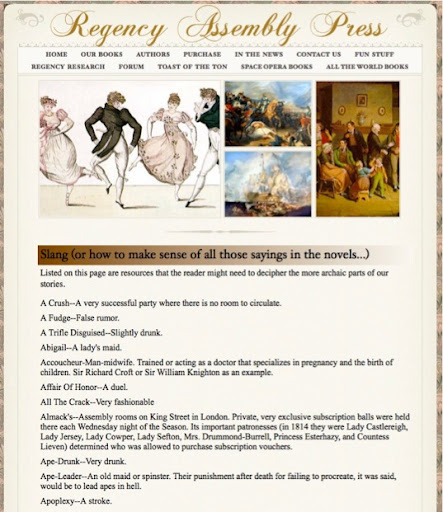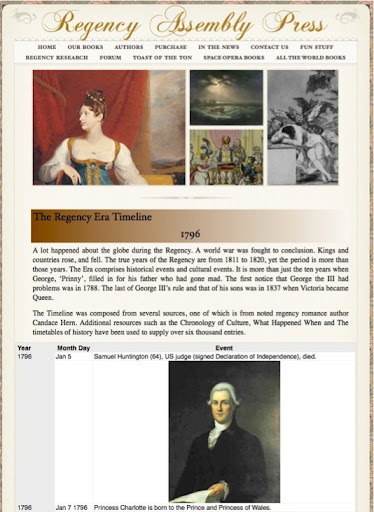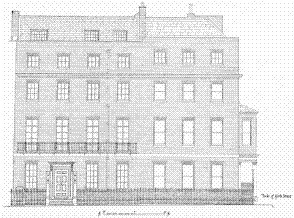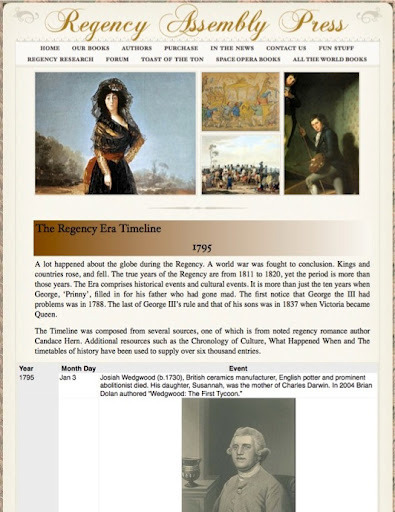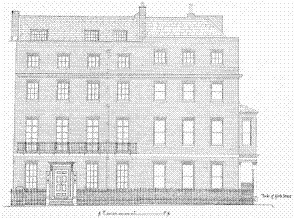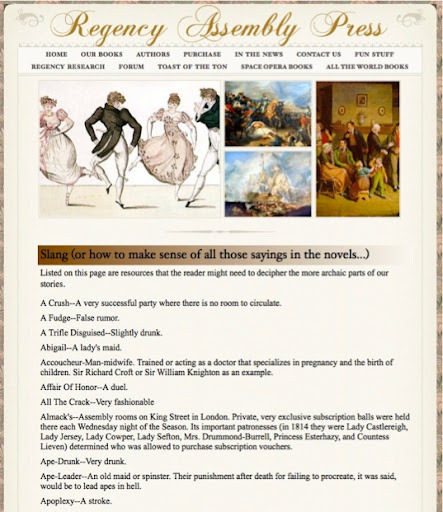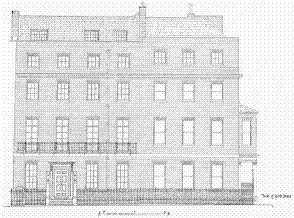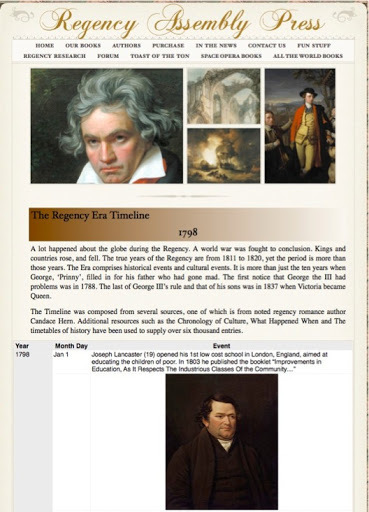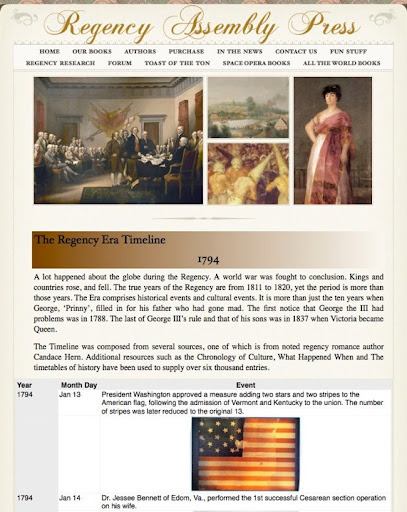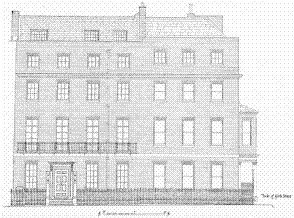D.W. Wilkin's Blog, page 350
June 28, 2012
A Regency Era Lexicon II (D-F)
Regency Research
For well over twenty years since I first started my infatuation with the Regency Era, I have maintained a lexicon to help me decipher Georgette Heyer (follow the link to Frederica, my favorite of her books), and others. Then as I began to write in the genre in the years 2000, I put more emphasis on it.
I have seen a few others on the web, but I have not seen any as complete as the one maintained at Regency Assembly Press that I have contributed to.
With the emphasis that has been placed recently on Research  there, with not only the Lexicon, but the Timelines, lives of the Prime Ministers, Dance Instruction and Regency Era Money, it is a growing resource for all Regency readers and writers. I urge everyone to have a look as it continues to grow.
there, with not only the Lexicon, but the Timelines, lives of the Prime Ministers, Dance Instruction and Regency Era Money, it is a growing resource for all Regency readers and writers. I urge everyone to have a look as it continues to grow.
I also provide here the next few letters of the alphabet to entice you to visit that page. Or even bookmark it for when you need to look up a particular Regency term.
•
Damned Hum–False rumor, lie, trick etc.
Damned Low Water With Me–Have no money, be in debt.
Dandy–A gentleman who is fastidious about his appearance, especially his clothing. He is not, as is often believed, a flashy or even flamboyant dresser, as was his 18th century predecessor, the Macaroni. George “Beau” Brummell epitomized the Dandy. He was concerned with perfect tailoring and fabrics, cleanliness, and simplicity of dress. He believed that good fashion should be understated and elegant, not eye-catching.
Dangling After–Hanging about, enamored of.
Darken One’s Daylights–To give a black eye.
Demi-Monde–Literally “half world”; a class outside of proper Society. Generally used to refer to those of questionable reputation.
Demimonde, Demimondaine–A demimondaine is woman of who gives sexual favors in exchange for payment; a mistress or courtesan. The demimonde refers to this class of women. From the French literally meaning half world, or underworld.
Derby–The major horse race in England, held at Epsom Downs in late May or early June. Pronounced “Darby.”
Dernier Cri–The latest thing; the newest fashion. From the French meaning “the last word.”
Despatches–Report usually from a senior commander, usually of an army, to his superiors, detailing the conduct of military operations.
Diamond Of The First Water–A very beautiful young woman. The phrase comes from a technical term used to describe diamonds. The degree of brilliance in a diamond is called its “water”, so a “diamond of the first water” is an exceptionally fine diamond.
Dibs Not In Tune–To be in poor financial state.
Dicked In The Nob–Crazy.
Dipping Rather Deep–Drinking quite heavily.
Disguised–Inebriated, drunk.
Dispatchers–Loaded dice with two sets of 4, 5 and 6 on them. Able to dispatch a man’s money easily.
Displays To Advantage–Fights well – (boxing cant.)
Doing It Much Too Brown–Overdoing it so that it is not credible.
Domino–A short hooded cloak usually worn with a mask at masquerades. It was worn over evening attire by both men and women.
Done To A Cow’s Thumb–Fatigued to the point of illness/fainting.
Double Sovereign–2 pounds, (approx $4000).
Dowager–The widow of a peer, eg the Dowager Countess of Somewhere. The term was not added to a woman’s title unless and until the new holder of the title married. For example, if the new Earl of Somewhere, the son of the late earl, is a young man when he inherits the title and has no wife, his mother continues to be styled Countess of Somewhere. When he married, his wife takes that title and his mother become the Dowager Countess. The term is also used informally, and disparagingly, to refer to an older woman of the upper classes.
Dower House–A relatively small house on an estate to which the dowager would retire when the new heir took up residence.
Downhills–Loaded dice that roll low numbers.
Draw Someone’s Cork–Punch in the nose and cause to bleed.
Drawing The Bustle Too Freely–Spending too much money.
Driving terms:–At home to a peg, Driving to the inch, Featheredge a corner, First-rate fiddler, Go-by, Pickaxe, Randem-tandem, Springing, Unicorn.
Driving to the inch–Driving term, the best type of driving.
Drunk As A Wheelbarrow –Very drunk.
Dudgeon–Bad mood.
Duenna–Chaperone. From the Spanish.
Dun Territory–In debt. The tradition is that it refers to Joe Dun, a famous bailiff of Lincoln in the reign of Henry VII, who was famous for his skill at collecting debts. Also possibly from the Anglo-Saxon “dunan” meaning din or clamor.
Eaten Hull Cheese–Drunk.
Elbow-Crooker–Drinker.
Entail–An inheritance of real property which cannot be sold by the owner but which passes by law to the owner’s heir upon his death. The purpose of an entail was to keep the land of a family intact in the main line of succession. The heir to an entailed estate could not sell the land, or bequeath it to anyone but his direct heir. Some entails were tied to a title and were defined in the original letters patent granting the title. The complications arising from entails were an important factor in the life of many of the upper classes, leaving many individuals wealthy in land but still heavily in debt.
Facings–Material of a different color that shows when the cuffs and collar are folded over. In the military, different colored facings implied different regiments.
Fagged To Death–Exhausted, tired.
Fair Gutfounded–Very hungry.
Fairly Flush In The Pockets–Quite rich.
Faradiddle–Variation of “taradiddle” – a falsehood or lie.
Faro–A card game in which players bet on the order that cards will appear when dealt from the bottom of the deck.
Farthing–1/4th of a penny
Featheredge a corner–Driving term, turn a sharp bend, or in a small space.
Fichu–A length of fabric, usually triangular, worn around the neck and shoulders. Sometimes tucked inside the neckline of the bodice, sometimes crossed over the bodice.
Fiddle–6 pence, (approx $50).
Fiend Seize It–Damn it.
Find Oneself On The Rocks–To have no money, be in debt.
Find Self At A Stand–To have no money.
First rate fiddler–Driving term, best type of driver.
Fit Of The Blue-Devils–Depressed.
Flash Of Lightning–Gin.
Flat–Person, able to be tricked.
Fleet Prison, Fleet Marriages–Fleet Prison was a prison for debtors. Fleet marriages were clandestine marriages that were performed at the prison without the need for licenses or banns during the 17th and 18th centuries. The practice was ended with the Marriage Act of 1753.
Florin–2 shillings, (approx $200).
Flounce–An ornamental row of decorative trim at the edge of a skirt.
Fly A Kite–Raise money.
Fly To The Time Of Day–Wise to the ways of the world.
Flying One’s Colours–Blushing.
Foolscap–Writing paper. The term refers to the size of the paper (17 by 13½ inches, which was typically folded, and sometimes cut, in half ) and not the quality or weight. The standard foolscap size was in use since the 15th century, and the name derives from the watermark in the shape of a jester’s hat that was once used to identify it.
Footpads–Thieves in the streets, muggers.
Fop–A gentleman who dresses in excessively elaborate clothes and has affected manners.
Four Horse Club–Also the Four-in-Hand Club, Barouche Club, the Whip Club. For excellent carriage drivers, there was a uniform; A drab coat that reached to the ankles with three tiers of pockets and mother of pearl buttons as large as five shilling pieces. The waistcoat was blue with yellow stripes an inch wide, the breeches of plush with strings and rosettes to each knee. It was fashionable that the hat should be 3 1/2 inches deep in the crown. Members also were to have barouches should be yellow bodied with ‘dickies’, the horses should be Bays, with rosettes at their heads and the harnesses should be silver-mounted.
Four-In-Hand–Driving a carriage pulled by four horses, an exercise requiring skill. The Four-in-Hand Club was a notable club for gentlemen who were excellent drivers.
Foxed–Inebriated, drunk.
Frank–A Member of Parliament, including peers in the House of Lords, could frank letters — mail them free of charge — by affixing his personal seal along with the word “frank” or “free.” This practice continued until 1840, when cheap postal rates were introduced.
Free-Traders–Smugglers.
Freebooters–A person who robs and plunderers, especially pirates and smugglers. From the Dutch “vrijbuiter” and the German “freibeuter,” meaning to rove freely.
French Leave–To take French leave is to go off without taking leave of the company: a saying frequently applied to persons who have run away from their creditors.The allusion is to the French soldiers, who in their invasions take what they require, and never wait to ask permission of the owners or pay any price for what they take.
Fribble–An effeminate fop; a name borrowed from a celebrated character of that kind, in the play Miss in her Teens (1746) by David Garrick.
Friday-Faced–A dismal countenance. Friday was a day of abstinence.
Fulhams–Load dice used in gambling, first made in the town of Fulham.
Full Of Juice–Very rich.
Funds–Government securities that could be purchased by investors. See also consols.
Fustian–Bombast; made up of pompous, high-sounding language. Also a coarse, heavy cloth made of cotton and flax.
Fustian Nonsense–Rubbish.








June 27, 2012
Regency Era Prime Ministers-Robert Banks Jenkinson
Regency History
Often in my research I keep needing to find who was leading the government and do this through every book. I thought that having the list handy would be good, and then turning it into a research webpage even better. Here is the list. After I post a few more Timeline years and write some more, I will work on the web page with notes about each PM.
The next PM I am doing is Robert Banks Jenkinson, 2nd Earl of Liverpool and I am hosting a page devoted to him and then all our period PMs at Regency Assembly Press. That page is here.
William Henry Cavendish-Bentinck, 3rd Duke of Portland
04/02/1783
12/19/1783
Whig
William Pitt the Younger
12/19/1783
03/14/1801
Tory
Henry Addington 1st Viscount Sidmouth, “The Doctor”
03/14/1801
05/10/1804
Tory
William Pitt the Younger
05/10/1804
01/23/1806
Tory
William Wyndham Grenville, 1st Baron Grenville
02/11/1806
03/31/1807
Whig
William Henry Cavendish-Bentinck, 3rd Duke of Portland
03/31/1807
10/04/1809
Tory*
Spencer Perceval
10/04/1809
05/11/1812
Tory
Robert Banks Jenkinson, 2nd Earl of Liverpool
06/08/1812
04/09/1827
Tory
George Canning
04/10/1827
08/08/1827
Tory
Frederick John Robinson, 1st Viscount Goderich
08/31/1827
08/21/1828
Tory
Arthur Wellesley, 1st Duke of Wellington
08/22/1828
11/16/1830
Tory
Charles Grey, 2nd Earl Grey
11/22/1830
07/16/1834
Whig
William Lamb, 2nd Viscount Melbourne
07/16/1834
11/14/1834
Whig
Arthur Wellesley, 1st Duke of Wellington
11/14/1834
12/10/1834
Tory
Sir Robert Peel, 2nd Baronet
12/10/1834
04/18/1835
Conservative
William Lamb, 2nd Viscount Melbourne
04/18/1835
08/30/1841
Whig
Tory* (Tory government, PM a Whig)
Born 06/07/1770 London
Died 12/04/1828 Kingston-upon-Thames, Surrey
Major Acts:
Importation Act 1815 – Prohibits import of foreign wheat until domestic reached minimum price.
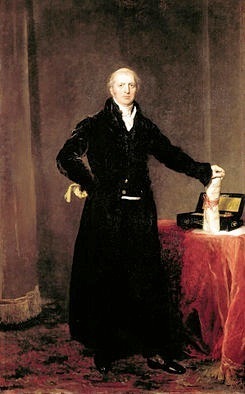
The Earl of Liverpool, Robert Banks Jenkinson, became known for repressive measures introduced to restore order, but he also steered the country through the period of radicalism and unrest which followed the Napoleonic Wars.
Having served earlier in his career as leader of the House of Lords, Foreign Secretary and War Secretary, Liverpool was asked to form a government after the assassination of Spencer Perceval in 1812.
Few expected Liverpool to survive in office very long, as at first his government seemed very insecure. Which had also been said of Perceval’s government. Liverpool’s government survived for 15 years.
But the opposition provided by the Whig party was weak and disunited, and Liverpool was able to draw on the talents of individuals such as Sidmouth, The Duke of Wellington, Castlereagh and Canning.
The ending of the Napoleonic Wars with France in 1815, aided by Wellington’s victories in the field, further boosted support for Liverpool.
But after the war, unrest broke out at home, partly caused by an economic recession that started in 1817. Unemployment, a bad harvest and high prices produced riots and protests.
Actions such as the repeal of income tax and the creation of the Corn Laws tended to make the situation worse. Lord Liverpool’s government reacted by suspending habeas corpus for two years.
Things became even worse in summer 1819, when large gatherings in favour of parliamentary reform culminated in a massive public meeting in Manchester on 16 August. Soldiers attacked the crowds, killing eleven and wounding many more.
The shocking event became known as the Peterloo Massacre. Liverpool’s subsequent ‘Six Acts’ curtailed the right to hold radical meetings.
The crackdown on liberty prompted an attempt by radicals in 1820 to murder Liverpool and his Cabinet and start a radical revolution.
But the Cato Street Conspiracy, as it became known, proved unsuccessful, and the conspirators were hung or transported.
During the 1820s Liverpool’s policy became increasingly liberal, and a period of economic prosperity began.
Liverpool also returned Britain to the Gold Standard in 1819. The anti-trade union laws were repealed, and many trading restrictions were removed.
A stroke forced Liverpool to resign and he died the following year. Liverpool Street in London is named after him.
Ministry
06/08/1812 04/09/1827
Lord Liverpool – First Lord of the Treasury and Leader of the House of Lords
Lord Eldon – Lord Chancellor
Lord Harrowby – Lord President of the Council
Lord Westmorland – Lord Privy Seal
Lord Sidmouth – Secretary of State for the Home Department
Lord Castlereagh (Lord Londonderry after 1821) – Secretary of State for Foreign Affairs and Leader of the House of Commons
Lord Bathurst – Secretary of State for War and the Colonies
Lord Melville – First Lord of the Admiralty
Nicholas Vansittart – Chancellor of the Exchequer
Lord Mulgrave – Master-General of the Ordnance
Lord Buckinghamshire – President of the Board of Control
Charles Bathurst – Chancellor of the Duchy of Lancaster
Lord Camden – minister without portfolio
Changes
Late 1812 – Lord Camden leaves the Cabinet
September 1814 – William Wellesley-Pole (Lord Maryborough from 1821), the Master of the Mint, enters the Cabinet
February 1816 – George Canning succeeds Lord Buckinghamshire at the Board of Control
January 1818 – Frederick John Robinson, the President of the Board of Trade, enters the Cabinet
January 1819 – The Duke of Wellington succeeds Lord Mulgrave as Master-General of the Ordnance. Lord Mulgrave becomes minister without portfolio
1820 – Lord Mulgrave leaves the cabinet
January 1821 – Charles Bathurst succeeds Canning as President of the Board of Control, remaining also at the Duchy of Lancaster
January 1822 – Robert Peel succeeds Lord Sidmouth as Home Secretary
February 1822 – Charles Watkin Williams-Wynn succeeds Charles Bathurst at the Board of Control. Bathurst remains at the Duchy of Lancaster and in the Cabinet
September 1822 – Following the suicide of Lord Londonderry, George Canning becomes Foreign Secretary and Leader of the House of Commons
January 1823 – Vansittart, elevated to the peerage as Lord Bexley, succeeds Charles Bathurst as Chancellor of the Duchy of Lancaster. F.J. Robinson succeeds Vansittart as Chancellor of the Exchequer. He is succeeded at the Board of Trade by William Huskisson
1823 – Lord Maryborough, the Master of the Mint, leaves the Cabinet. His successor in the office is not a Cabinet member
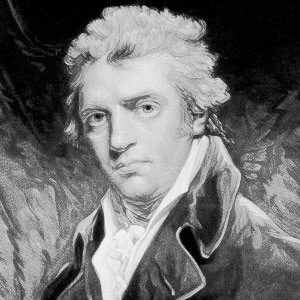
“(I consider) the right of election as a public trust, granted not for the benefit of the individual, but for the public good.”
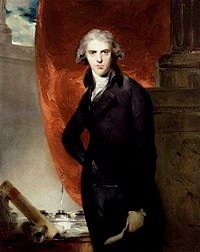
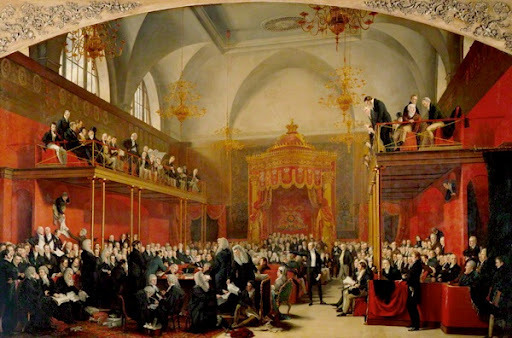
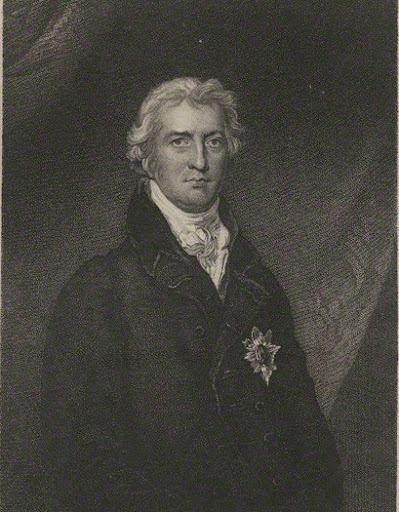
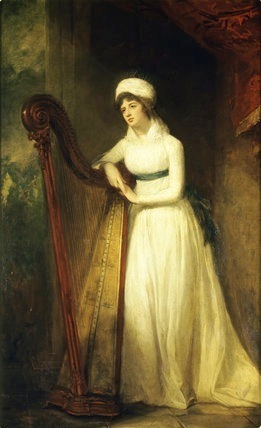








June 26, 2012
A Regency Era Timeline 1796 Revisited and a new Regency Novel-The Heir
My previous posts I’ve explained that I was working on the Regency timeline. I posted my entries for 1788 thru 1798.
Now I have the 1796 Timeline again. I went back added a significant amount of graphics. This is the last of the original years that I have had to revisit and add graphics to. With this posting, I will then turn to alternating between our pages for Regency Era Prime Ministers and new timelines. The next will be 1799.
I have uploaded all these years to the Regency Assembly Press website. You can see a little preview of this below in the picture. I especially like how the Duchess of Alba by Goya looks a lot like Cher.
My sources which include the Internet and The Timetables of History by Grun and Stein as well as the Chronology of CULTURE by Paxton and Fairfield should cover a lot of events. There are now over 5000 listed for the period between 1788 and 1837 when Victoria comes to the Throne. I have also just found a third book I own with timelines in it, very USA centric though.
as well as the Chronology of CULTURE by Paxton and Fairfield should cover a lot of events. There are now over 5000 listed for the period between 1788 and 1837 when Victoria comes to the Throne. I have also just found a third book I own with timelines in it, very USA centric though. 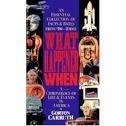 What Happened When by Carruth. I also have added a Dorling Kindersley book
What Happened When by Carruth. I also have added a Dorling Kindersley book 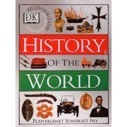 , History of the World.
, History of the World.
I may post a year at time every so often in between scanning through all these to find something that will be a good article for this blog and the blog at English Historical Fiction Authors. I will also have the full listing up shortly at Regency Assembly Press.
Those who have feedback, it is appreciated or if someone would like a specific year in a future post. The very first entry is to show who was Prime Minister of Great Britain, later it was the United Kingdom, during the period of the chronology. In choosing our dates, 1788 is the first sign of madness in George the III, it is the beginning of the end of the French Monarchy with the riots in Paris, it is the time when the mama’s of the girls during the true Regency would be girls going to London for their own season, and when our heroes are young lads or babes as well.
We need to know of the events that occurred when they were children, as well as what happens when they are on stage in our stories.
Click on the link below or the picture to go to the entry. More years coming. The list is now over 5000 event entries long and growing.
After the Regency Timeline, I plan to do a short addition on Regency Era Prime Ministers. They always come up in my research and I think we need a page where we can find out all about them in one place. Then, the Edwardian Timeline. I am thinking the years 1890 to 1918 (The end of WWI)
Regency Assembly Press 1796 Timeline
The Writing LIfe
My new writing project, The Heir finished. I will finish off Chapter 3 here, and then advise through the blog when I revisit the draft for publication. My new project will be a Fantasy, the third part of my trilogy on the son of Duke.
The Heir is about the heroine of course can not stand the hero, who is trying to understand why she dislikes him so. Part of the action takes place in St. James Square, where I have located our Heroine’s home. That was written about, in a blog post from fellow writer Angelyn Schmid on her post about Let’s do Business in Bed.
I enclose a few more paragraphs from the first draft.
Chapter 3 continues
Spend a little money, or actually a lot of money to be elected and the well versed politician could make much more. And the honest politician, were there such a creature, could well go broke making friendships and seeking to support justice, rather than ones pocket book.
Mr. Perceval took a moment and then let out a bombastic laugh. “Well said. Yes we shall need your services. Can you make a speech? Did you not tell me Lennox that he was the best read man of your acquaintance. I do hope my lord that you acquaintance is as large as your stables, then we shall expect such oration from this young man that perhaps he will one day serve his majesty by taking upon himself my small job.” Perceval laughed once more and then waved himself off.
“Well my lad, the Prime Minister knows your name.”
Sebastian replied, “And has a notion that soon I am to take Mr. Poppets seat? I agree that Poppet does little credit to the Tories and to yourself, sir. I had no quest to take his seat however.”
“Shh, we do not refer to ourselves as Tories any longer. We all think of ourselves as Whigs of course, though we are Tories in practice. Now as to Mr. Poppet, the by-election for our borough is upon us this year. I am not offering my support to the man.”
Sebastian took but a second to reflect, “But my lord, there is only one vote cast in that borough. Your own. If you do not offer him support, none shall stop you from choosing another.”
“It is so, that I am the only man who may vote, but I do want the tenants to know who represents them. They shall look to the man elected as their champion. Do you know, before I met the first Countess, Lady Samantha, who your sister is named after, and before I was Earl but only heir to my father, that I held the borough. That it was I who spoke in front of the tenants. It was long ago now. Before you were born, that I was the member. Great days that was. Great days, with Pitt leading us. I would speak to a question on occasion and well was I heard.” The Earl was lost in his memories then. Sebastian did not want to interrupt for there was a look of rapture upon him.
“Now you, I know you to be a man of letters. It was certainly costly enough to send you to the university, though I do not begrudge what I have spent on you and your siblings. You are my heir and I have learned to face the notion that Lady Elizabeth and I will not have a child. I have spent too long neglecting my teaching you the responsibilities of our station. You do realize that soon enough you will be called on to be the lord down at Combe Edinsley. I should like you to consider a long stay with us at the end of the season as well as of course making the house your residence when you attend the hustings.”
Sebastian felt he was being guided in life again, and once more his choices were being made for him. Not he making choices. “My lord, I am obliged to you, but you can not be sure that I shall be any more attentive than Mr. Poppet.”
“Oh, I am sure you will do your duty much better than Poppet. He is a sick man, and he uses drink as his medicine. That is no cure for what ails him, and it has gone on so long that death may be the only means he has to be rid of his ailment. Poppet though is not your concern, but tell me, were you Earl, what would you do with such a man? If I was gone and this instant you were Earl, to go into Lords and help the country, or would you return to our estates and ignore what is happening. By sitting in the hall below, you may effect what your brother James and Henry do. You realize that, do you not? And were you the member in Commons, then you may influence what the endure in their travails as well now. Before I am called to meet the lord. I do not fear that I shall going below for as profligate as I have been, I do not think I have given myself over to the devil.”
“No, my lord. No tale I have ever heard of you has said anything near that. You are considered an example for most men.”
“Except I spend too much time with my horses.” The Earl said.
Sebastian had to agree, “It has been said. And that you mayhap should spend time with your friends outside of those that you meet with here at Lords.”
“Ha,” he laughed, “That is what the Countess has said as well. Poor thing, been sick for a week and telling me that I must entertain should I wish to be a part of Perceval’s cabinet. So we have you to dinner and our other relations, then we shall try to discuss politics with those I must impress. She has little faith that I can talk about other than horses.”
“Can you my lord? Surely you would have me join you here in the work that Parliament does and I must speak of more than the classics. It, I do not think, will inspire those others of the Commons, nor those on your estate that I should speak to if I were to speak at the hustings.”
The Earl then went on to tell Sebastian of his early days in the House of Commons and the several speeches he had given in detail, one the second to last before the vote was called so he knew that what he had said had bearing on the matter. That he had helped determine the course of empire. Sebastian listened with half an ear. One had to stop listening and think.
That was what he needed to do then. Think. Sebastian of course could have asked for time to tender an answer, but he usually did not see the man for six months again. Yet he was to see the man in three days at his home. It meant, Sebastian thought, that he would see his cousin Annabella who had shown her contempt for him last year.
He had never done anything to warrant such hatred except for his being born, and there being no other man to inherit between her father and he. Sebastian thought it quite petty for the woman to take a hate towards him. If she could not control her spleen so, it was not his loss. Most likely it was his gain, for she had been thrice a ninny the year before with the men she had allowed to throw themselves at her.
If they had made an offer for her, he was sure the Earl had sent them packing. They each had offered for a dozen other women who had great wealth, but guardians who knew that the suitors were made of paper and nothing else. If he was a rake, at least no one would say he was made of paper. Or would they? Had he done anything to prove that he was someone who was serious. Not since he had returned from Corunna.
None could point and say that he had done much but spurn the acquaintance of all women he acknowledge by their sixth meeting.
He indeed was tending towards rakeishness, for that would quite fit the definition of a man who used a woman ill. If a man did that to his sisters, he would have to call them out. Considering the number of women Sebastian had shown interest in, he was surprised that no brother or father had challenged him, but then Prinny had made him a baronet because he had been quite good with gun and saber in battle. The truth of that was that he had survived, more than any other tale that was set about the Ton.
So to be serious, was that worthwhile. He had wanted occupation, and this would be it.
“I know that these tales are perhaps not so profound now, but in the day, they meant everything to me. It was how I met Lady Samantha and her admiration for more work allowed me to know she admired me entire. I knew then to offer for her and none other, for no other cared a fig at all what I did at night here at the House.”
“I am sure that your time in Commons was important and you must tell me more of it. I am looking for direction, and of course your support will carry me in such an endeavor. You are aware that should you have an heir, as I have long prayed for, then I must find a means to support myself…”
The Earl held up a hand. “As I said, I do not think that Countess Elizabeth shall be so blessed, so the line shall pass to you. Annabella could marry and I could make allowance were she to have a boy, but if that is the case, I shall draw up documents with my lawyers that you current allowance shall be entailed on you and any wife of yours. Should that not suffice?”
“My lord, were you to have an heir other than myself, it is too much.”
“Hardly. Here then, you have bought some little property but need more in order that you support yourself. What if we gift you with some lands we have. Enough that there is an income. You would have them when you become Earl, and if your line were replaced, it would still give you a comfortable income all your days. I have some little lands I may do this with. I am told that you have been lucky at the tables and I do not know that such a sobriquet attached to my heir is something that Bath should have. I know that you are not a reckless gambler else my banker would be asking that I sign your debts, yet he tells me that for near two months you have not drawn on your allowance, and that the bills for your household have gone elsewhere.”
Sebastian said, “I took the liberty of establishing mine own accounts my lord. It did seem prudent.”
The Earl shook his head, “You are a credit to your father, and I should have taken a greater hand in your rearing when he died. I am sorry that I have not now. And it is too late to have anything to say with your brothers. There careers are foreordained now. The girls, you will allow me to act like an indulgent uncle. I spoil Anna terribly, I know, but I should do so with your sisters and perhaps show that I am not some ogre. I should imagine the expense of their trousseau for the season shall be large, I know that Anna and the Countess have already told me that it shall be more this year than last since last year the men we had call were not those that should have.”
“I had heard somewhat similar my lord. There are men, and then there are men who do not care whom they wed, but do care if their bride will weigh as much as their portion.”
The Earl laughed, “Well Anna is quite a piece but not large at all. Yet I think any who are serious will see she is to get a good dowry. Your sisters, your father’s estate made allowance. If there is help needed to encourage a man, rather than an afterthought, you will speak to me. If the lands were already yours, you could attend to your sisters. No need for them to make a marriage that they will be unhappy with because you do not have the money you need now, but will have it ten years hence.”
“I am sure it would be longer than that, my lord.” The Earl had talked about his demise in nearly every interview the two had since Sebastian had returned from the Peninsula. Sebastian had always wondered if it was some way of pointing out that he needed to not consider an adventurous life which could end in disaster. That the Earl did not want to change the titles succession again.
“I am near sixty and know that I am certainly closer to my end then I am to my start. Now, let us talk more about the seat in the House. Naturally all your expenses as a Member will be paid for by me. You need not worry about anything extra that being a member should cost, and if you succeed and need to socialize, host functions as I know one should when aspiring to be taken seriously in our circle, then I shall pay for that as well. In fact, the Countess assures me that if I have you to represent our borough, then you should attend all our soirees as she calls em, for the rest of the Season.”
Sebastian could only allow how that made sense. “Politics is not made so well on our speeches in the Houses, but on our suppers in our houses.”
The Earl looked up at that and smiled, “Speeches in the, suppers in our houses. I like that. But that does seem to be correct. We can talk amongst ourselves and often bend and shape laws to what is needed to get them passed in the Houses. I have been remiss in that I had forgotten that was the case. I had spent too much of my time thinking I need not bring home my work, but using my home is part of the work. The great lords that dabble in politics know this. We adopt our favorites, our clients and see to it that England rises and shall not fall.”
Sebastian said, “I see that. Might I have some time to think on this? You would not maneuver me into the corner without allowing to ponder this. I had not thought to worry so about politics until, well until I had to take you seat in Lords, my lord.”
“No, of course you may give my your answer in time. But you really do not have the luxury to wait for when I am gone. There is much to learn about politics and governance. Did not these last years show you that managing a household of so many people is not easily done? And then you purchased land. Have you not learned again that having tenants who rely on you is also not so easily handled. The same with the nation. There are many things that will seem to be just, but they also may seem to be shortsighted. Government needs to be a long game. A very long game, and even when you look at the victory of a year or two, you must plan for that victory to be forever. You may even admit defeat if it will bring true victory later on. Do you not think we would let Wellesley flounder if it meant that we were assured of success against the Tyrant through some other action. We aren’t of course, but we would.”
Sebastian had never considered that but it gave him something to ponder. He took his leave of the Earl, looking forward to dining at St. James Square some few days in the future. In the meantime he had to introduce his sisters to his friends and begin their calls. Though should the Earl’s other family be at his house, as he mentioned, then his sisters were destined to meet the Beauchamp’s. The very handsome and fashionable Viscount Christopher would dazzle their eyes and then he would say something that was witty, and Sebastian’s sisters would cover their ears.
“When are you to take us out, brother? We have been home all day, and we dined in last night as well.” Jennifer said later when they had gathered for dinner.
“I did explain that our cousin summoned me to speak with him. That we could make no plans, though we shall meet with some of my friends tomorrow. They have assured me that they will call.” He said.
“Jennifer is just impatient. I am glad that we do not have do dine with the Chaperones at every meal,” Samantha said.
Sebastian “No, if we are just family, then we do not have to eat with them but can have time to ourselves. It is only should we have other society that we will have the ladies join us. Now it is through the fortune of blood that we can afford to sit at such a table for dinner, for I have earned no money, nor had our father earned much either. Henry, who has successes, shall no doubt make a name of himself and it will be up to you two to help guide him to a wife when he returns from the sea. He shall want to have a family, and be of society I think, as will James. Though James shall take matters into his own hands.”
“As you have done? We may not have had any callers other than Lady Margaret today who wished to meet our chaperones, but she told us what news she had when she arrived at her daughters house. Twenty ladies all expected an offer, and you have given none any sign that they have held your heart. At first it was thought that you were to be caught and all the mamas wanted to have you hooked for their daughters. The Earl’s heir. You are to have a fortune. But for three years you have played with the affections of every young lady of means. You are labelled…” Jennifer had a lot to say.
Sebastian added before she could say it, “a Rakehell? It is not a name I would call myself. I had little idea that so many women expected an offer. I never, I assure you gave them such presumption. I did not kiss their fingers. I did not read, or worse, write poetry to them. They had no indication from myself that they were the true beating of my heart.”
Samantha asked, “Have you met the woman who is the true beating of your heart?”
Jennifer looked as if she had wanted to say something that was sure to lead to another argument, but that seemed to stop her. Not that he felt that he was arguing with his sisters, but there certainly was an interrogation occurring.
“If I have, I assure you that I would not tell you, unless I could say with confidence that such a lady reciprocated those feelings and you could wish me happy. To do so before I was sure of such could only lead to my being truly labelled Rakehell. I assure you, it is not a name I am deserving of.”
Jennifer said, “It will stand you well in the House of Commons. Women and mamas will despise you were you truly a Rake, but men, they all must admire such character and action.”
Sebastian shook his head, skewering a prawn on his plate so that he could chew it. “Now that I am not sure of. Many in the House are unmarried of course. Men of the world, but there are many fathers as well. I can not think that a father should like his daughter to be taken advantage of by such a man. I may have more work to do this year to repair my reputation. I may have a great deal of work to do to be sure that whatever has been attributed to me does not become attached to you.”
Jennifer had not seemed to think that would occur. “You do not mean to imply that you have behaved so improperly that my chances shall be ruined.”
“No. Not at all. And should any many say so, they shall find that they will have me to deal with the matter as much as father would have. You will not remember him much as he has been gone for many years now. But he would have challenged a man to a duel at the mere thought, let alone mention of such. James has met several captains in the Navy who were good friends with father and say he was quite skilled in such matters.”
Samantha asked, “Are you skilled in dueling? I would not like you to defend our names and end up dead over the matter. James and Henry risk enough as it is. I thought you were heroic to venture to the war but I was a child then. Now I think you were very foolhardy to have chanced it.”
Sebastian smiled, “You are right. I was very foolhardy. It made me aware that I would never do something like that again. Do not fear. But I would not let an insult against you or our name go unpunished.”
“But you could be hurt in a duel. You could be killed.” Samantha said. He could see that Jennifer was upset by this as well. Then it dawned on him that all them had lost their parents some years before. Left alone with only each other, and he and his brothers abandoning them to have careers. They were terrified that he, or the other two would die. And the other two were in careers that put them in a great deal of danger.
“I would only do so should I have to.” He said choosing his words with care.
Samantha said, “Even so, you could still be hurt. What do I care how others think a name is so important. Isn’t it enough that the French want to attack us, that we would have to fight amongst ourselves.” Then Sebastian knew that his sister was right. Why would he fight another englishman to defend honor, when they were fighting the French to stop tyranny.
“I will give the matter thought. You are concerned and I shall not quickly say a thing to make you calm, and then later when it seems expedient do another action entirely opposed to such a promise. No, I shall think on the issue. The Earl even advised me today that successful government must be carried out the same. That one must look long at a problem and think what the solution shall be in the years to come. Not just in the months that are at hand.”
The conversation turned and then later, as a custard was offered for them before the ladies went through to the drawing room, and he would have some port, a cigar should he wish it, it came back again to the Earl and his family. “Did you not tell us that you met with Lady Anna our cousin last year?”
“No, I became acquainted with her at a ball where I do believe, I was given the cut direct. She wrote an apology that I believe that the Countess directed her to do so. She knew who I was, but when I asked her for a dance, all had been taken. I was snubbed.”
“Oh my. Our own cousin as well.” Samantha said.
Jennifer observed, “It must be something more that that. You must have been a complete bore to her earlier. She came out at the beginning of last season.”
“Our paths did not cross till the one ball, and then I made sure that they did not cross again. I did not want all the Ton to think of this as an ondit. I am her father’s heir and were the Ton to think that there was animosity between us, it would not be well. The Earl would suffer by it as well, and he, we owe much too. We should surely have been in dire straits should he have not come to our aid when father was killed.”
The girls nodded. Each year they wrote very nice letters to the Earl at Christmass time thanking him for his generosity. Sebastian did not know if the Earl read them, but he had told the girls that making the letters personal, spending time with them, would one day reap them benefits that they could not begin to imagine. And of the offer to help with the dowries was what had come of those letters, than Sebastian had proved prescient.
Their father had died at the Battle of Copenhagen, and their mother a few years after. Sebastian was quite sure that Samantha had little remembrance of their father, and Jennifer probably only saw the man a little more, though he had been home for a spell when Jennifer was small. They even went to Plymouth as a family while father outfitted his ship before going forth. Henry had thought that a great adventure. Sebastian hated it for it meant that their father would once again be at sea for months and they would not see him. Other boys in their village saw their fathers each day. Sebastian and his siblings were lucky to have that luxury only when their father was in quest of a new command, and then he would venture to London often and wait at the Admiralty to try and get a posting.
That was humiliating, he remembered his father saying, and Henry agreeing when he too had waited nervously with other officers for such luck to come his way. It had with the influence of the Earl of Bath and of politics. Now more than ever, Sebastian was sure that Henry had gotten his ship because someone wanted favors from the Earl. And the Earl was happy to agree to them.
It was truly a foregone conclusion. Sebastian was the head of his branch of the Lennoxs. A branch that had owed all it had to the generosity of the Earl. His education, James commission, the girls expenses boarding with Aunt Margaret, and the augmentation of their Dowry. The Frigate that James commanded allowing him to accumulate prize money. If the Earl crooked his finger and said that he wanted Sebastian to represent a pocket borough, then he would. If the Earl said to vote against all the beliefs Sebastian held, he would do that as well. Part of being groomed for becoming the lord of Bath was to know who you owed and how you would pay them back.








June 23, 2012
Regency Era Prime Ministers-Spencer Perceval
Regency History
Often in my research I keep needing to find who was leading the government and do this through every book. I thought that having the list handy would be good, and then turning it into a research webpage even better. Here is the list. After I post a few more Timeline years and write some more, I will work on the web page with notes about each PM.
The next PM I am doing is Spencer Perceval and I am hosting a page devoted to him and then all our period PMs at Regency Assembly Press. That page is here.
William Henry Cavendish-Bentinck, 3rd Duke of Portland
04/02/1783
12/19/1783
Whig
William Pitt the Younger
12/19/1783
03/14/1801
Tory
Henry Addington 1st Viscount Sidmouth, “The Doctor”
03/14/1801
05/10/1804
Tory
William Pitt the Younger
05/10/1804
01/23/1806
Tory
William Wyndham Grenville, 1st Baron Grenville
02/11/1806
03/31/1807
Whig
William Henry Cavendish-Bentinck, 3rd Duke of Portland
03/31/1807
10/04/1809
Tory*
Spencer Perceval
10/04/1809
05/11/1812
Tory
Robert Banks Jenkinson, 2nd Earl of Liverpool
06/08/1812
04/09/1827
Tory
George Canning
04/10/1827
08/08/1827
Frederick John Robinson, 1st Viscount Goderich
08/31/1827
08/21/1828
Arthur Wellesley, 1st Duke of Wellington
08/22/1828
11/16/1830
Charles Grey, 2nd Earl Grey
11/22/1830
07/16/1834
William Lamb, 2nd Viscount Melbourne
07/16/1834
11/14/1834
Arthur Wellesley, 1st Duke of Wellington
11/14/1834
12/10/1834
Sir Robert Peel, 2nd Baronet
12/10/1834
04/18/1835
William Lamb, 2nd Viscount Melbourne
04/18/1835
08/30/1841
Tory* (Tory government, PM a Whig)
Born 11/01/1762 Audley Square, London
Died 05/11/1812 Parliament, London
Major Acts:
Regency Bill 1810 – Enabled the appointment of Prince George as Regent
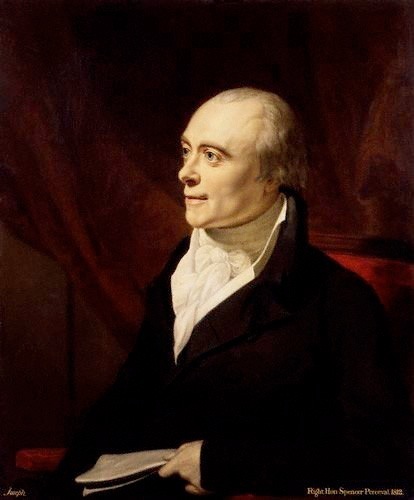
Spencer Perceval is best remembered as the only British prime minister to be assassinated. A professional lawyer, he made his mark as by holding down the senior posts of Solicitor-General and Attorney-General. An admirer of William Pitt the Younger, he was politically conservative and an active Anglican, opposing Catholic emancipation.
In later life he became an expert on Biblical prophecy and wrote pamphlets relating to prophecies that he had discovered.
When the Duke of Portland put together a coalition of Tories in 1807, Perceval served as Chancellor of the Exchequer and Leader of the House of Commons.
With Portland old and unwell, Perceval was effectively the chief minister, and even lived at 10 Downing Street.
In 1809, Perceval formally succeeded the Duke of Portland as Prime Minister.
It was a difficult time due to the upheavals of the Industrial Revolution and the Napoleonic Wars, and the final descent of George III into madness. His government also suffered from the absence of most of the senior statesmen of the period. He had to serve as his own Chancellor after obtaining six refusals of office.
Assassination
After two years his government had survived much longer than predicted amidst a severe economic depression. Indeed, it began to seem that the situation of his government looked as if it was set to improve.
But Perceval’s administration ended dramatically on 11 May 1812, when he was shot dead in the lobby of the House of Commons on his way to attend an inquiry into the recent Luddite riots. His last words were, appropriately, ‘Oh, I have been murdered’.
The assassin was John Bellingham, a merchant who had incurred business debts in Russia.
He had tried to recover compensation from the government for his losses, but was refused. He therefore sought revenge on a representative of that government and carried out his dark wish.
Perceval’s body rested in 10 Downing Street for five days, mourned by his wife and twelve children. Bellingham was later tried and hung for Perceval’s murder.
Family
Perceval left a widow and 12 children. He had only a little more than 100 pounds in the bank. Parliament voted 50 thousand pounds to his children and an annuity to his eldest son Spencer of 1000 a year.
Ministry
10/04/1809 05/11/1812
Spencer Perceval – First Lord of the Treasury, Leader of the House of Commons, Chancellor of the Exchequer and Chancellor of the Duchy of Lancaster
Lord Eldon – Lord Chancellor
Lord Camden – Lord President of the Council
Lord Westmorland – Lord Privy Seal
Richard Ryder – Secretary of State for the Home Department
Lord Bathurst – Secretary of State for Foreign Affairs and President of the Board of Trade
Lord Liverpool – Secretary of State for War and the Colonies and Leader of the House of Lords
Lord Mulgrave – First Lord of the Admiralty
Lord Chatham – Master-General of the Ordnance
Lord Harrowby – Minister without Portfolio
Changes
December, 1809 – Lord Wellesley succeeds Lord Bathurst as Foreign Secretary. Bathurst continues at the Board of Trade.
May, 1810 – Lord Mulgrave succeeds Lord Chatham as Master-General of the Ordnance. Charles Philip Yorke succeeds Mulgrave as First Lord of the Admiralty.
March, 1812 – Lord Castlereagh succeeds Lord Wellesley as Foreign Secretary.
April, 1812 – Lord Sidmouth succeeds Lord Camden as Lord President. Camden remains in the cabinet as a minister without portfolio.
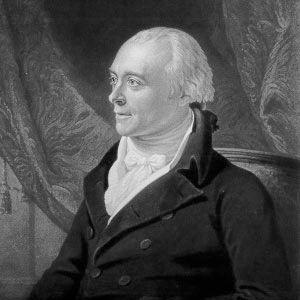
“I have nothing to say to the nothing that has been said.”
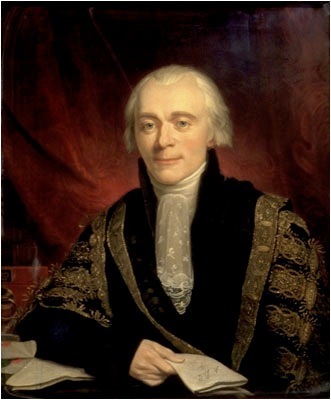
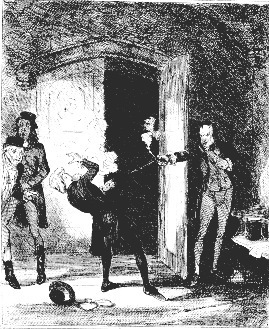








A Regency Timeline 1795 Revisited and a new Regency Novel-The Heir
The Regency Timeline
My previous posts I’ve explained that I was working on the Regency timeline. I posted my entries for 1788 thru 1798.
Now I have the 1795 Timeline again. I went back added a significant amount of graphics. I will be doing this with all the years I previously posted and then ensuring that the new years have a lot of graphics as well.
I have uploaded all these years to the Regency Assembly Press website. You can see a little preview of this below in the picture. I especially like how the Duchess of Alba by Goya looks a lot like Cher.
My sources which include the Internet and The Timetables of History by Grun and Stein as well as the Chronology of CULTURE y Paxton and Fairfield should cover a lot of events. There are now over 5000 listed for the period between 1788 and 1837 when Victoria comes to the Throne. I have also just found a third book I own with timelines in it, very USA centric though.
as well as the Chronology of CULTURE y Paxton and Fairfield should cover a lot of events. There are now over 5000 listed for the period between 1788 and 1837 when Victoria comes to the Throne. I have also just found a third book I own with timelines in it, very USA centric though. 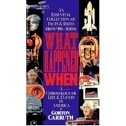 What Happened When by Carruth. I also have added a Dorling Kindersley book
What Happened When by Carruth. I also have added a Dorling Kindersley book 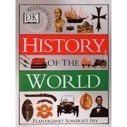 , History of the World.
, History of the World.
I may post a year at time every so often in between scanning through all these to find something that will be a good article for this blog and the blog at English Historical Fiction Authors. I will also have the full listing up shortly at Regency Assembly Press.
Those who have feedback, it is appreciated or if someone would like a specific year in a future post. The very first entry is to show who was Prime Minister of Great Britain, later it was the United Kingdom, during the period of the chronology. In choosing our dates, 1788 is the first sign of madness in George the III, it is the beginning of the end of the French Monarchy with the riots in Paris, it is the time when the mama’s of the girls during the true Regency would be girls going to London for their own season, and when our heroes are young lads or babes as well.
We need to know of the events that occurred when they were children, as well as what happens when they are on stage in our stories.
Click on the link below or the picture to go to the entry. More years coming. The list is now over 5000 event entries long and growing.
After the Regency Timeline, I plan to do a short addition on Regency Prime Ministers. They always come up in my research and I think we need a page where we can find out all about them in one place. Then, the Edwardian Timeline. I am thinking the years 1890 to 1918 (The end of WWI)
Regency Assembly Press 1795 Timeline
The Writing LIfe
My new writing project finishs today. It is another regency, tentatively titled The Heir. I am now over 300 pages into it. The heroine of course can not stand the hero, who is trying to understand why she dislikes him so. Part of the action takes place in St. James Square, where I have located our Heroine’s home. That was written about, in a blog post from fellow writer Angelyn Schmid on her post about Let’s do Business in Bed.
I enclose a few more paragraphs from the first draft.
Chapter 3
Sebastian was not surprised to receive his first yearly summons to see the Earl. And once again at Westminster Palace. His sisters were to come the day before, and then on Friday, he would visit with his cousin. The summons was never something that he could respond with a polite no. At least Sebastian did not feel he should since the man supported him. The Earl also did ask how his family fared and would question him about it, seeing if there were any instructions that he should issue.
That meant that would the Earl need to send money for James Mess bill, or for Hank to outfit his stores aboard ship, then Sebastian must mention it, the Earl say that it was a small matter and all that Sebastian need do is make some instruction to the bankers. It meant writing a note to both banker and the Earl that the Earl could then forward his approval to the bankers. A convoluted way to secure monies, but it was how the Earl worked since he did not visit his bankers. They visited the Earl.
Sebastian put that from his mind, for he had not seen his Sisters but briefly when the Season had ended the prior year. He had journeyed to his aunt’s house near Southampton. There he found them, as always, living quite happily. He was not sure that the change from a small country village to that of London was something that they were going to be ready for. Yet the Earl had hired tutors that were supposed to prepare them for such. Women who had claims to society, unlike Countess Elizabeth, a woman who had been hired by the Earl’s first wife and the education of cousin Annabella put in her trust.
“Sebastian, do you not come to the hall to greet us?” He heard a voice from the foyer of the house. He moved as quick as he could from the desk where he had been reading the contracts for new lands to be added to his holdings in Kent. He and Marlowe had been very lucky at the tables three nights before and the money in his accounts were ready to be put to use again. Very lucky indeed. Marlowe said that if he was not a fool, his allowance had been made for the year and it was till but February.
“Here Samantha,” he said as he reached the landing and then looked down to the ground floor. “And Samantha you must not speak so loudly. I am sure, but a lady does not yell so.”
Jennifer, who was removing her bonnet, said, “That was not a yell brother, I assure you. Our little sister is quite capable of yelling.”
“Where is Lady Margaret, I am sure that I wish to greet her as well.”
Jennifer smiled, now working on removing her gloves a finger at a time while Samantha was examining every part of the hall. “Our aunt has gone ahead to her home. She has professed her love for us, but her joints, in getting in and out of the carriage, climbing the steps and then returning to her carriage, all would have been a great deal of work.” Jennifer said.
Sebastian reached the ground floor and then guided his sisters into the day room. “Here, we shall have tea, and some treats. This is of course now your home. But I am concerned that Lady Margaret did not stay.”
Samantha said, “We are no match for her grandchildren. She longs to go to her own family and now, she hopes is done with us, for we have been little joy for her, despite all that the Earl’s money has helped.” Lady Margaret had been married to a naval man as well. Sir Ben had survived his years at sea but was taken from the family by a failing heart. Her son was at sea in the family tradition, and her daughter here in London married to a clerk who did work for the House of Commons. Sebastian knew that the money that the Earl paid to Lady Margaret to maintain a decent house in the country, some made it’s way to London that her daughter and the many grandchildren did not live in penury.
“Well, you must have a chaperone, the both of you, but especially Jennifer. I am to launch you but I can not be at your side as a chaperone will. Lady Margaret would serve such a purpose. I shall also introduce you to the dowager Viscountess of Lowford, for she is launching her daughter Henrietta this season and I hope you shall be friends with her as I am friends with the Viscount.”
“I have heard that the Viscount Lowford is handsome.” Jennifer said.
“No one can be as handsome as our brother though. Is he not the most handsome of men. Are you a dandy?” Samantha asked.
“I should hope not. And Samantha, one does not praise a person so to their face. They shall develop a complex. But I thank you for your compliments. I suppose there are many who thinks that Lowford is handsome, and he is more a fashion plate that walks, then I. My clothes, are fine it is so, but I see no need for more then five coats all told. In my set, it is only Lowford who would swear that five is not even the minimum that one should own. That one needs at least thirty good coats.”
Jennifer seemed to agree, “At least thirty. Brother, you do know that I shall need many new dresses so that I can go out in society. And we shall need horses to ride, and you must throw a ball…” Jennifer had a long list, and it took some while for her to recite it.
“I do understand my obligations and have made allowance for it. Now, you do know that your dowry is not some great sum. I am not the Earl of Bath, nor do I have any greater claim than at present, should he have no son, that I am his heir. He still may do so and then we shall not have a great deal of money to give to a suitor. I should like you to think on that. You do not need marry a great fortune, but our family fortune will not even keep you in modest accommodations from the three percents.”
Samantha looked out a window onto the street while Jennifer said, “We know. James has done better with prize money than father ever had, and if not for the Earl’s generosity we would not even have this. Samantha and I both know what our destiny is, but surely, amongst the men of London, there are those who have fortunes and will look on the sisters of even a near Earl, with love.”
Sebastian smiled, “Yes, of that I am sure. And I know many of them. I shall introduce you to several as is my lot. Now, we must send for the ladies who shall be interviewed to be your chaperones. For they are to live here and must be agreeable to yourselves as well as to me. I have a list and they await our summons.”
In the end, two ladies were chosen. One had lost her husband in the war who was in the senior service, and the other was a widow of an officer of the junior service. Sebastian was sure, that Samantha was already devising names for the two ladies, but that was to be expected of a young girl still two summers away from her Season.
Mrs. Humphries spouse had been in the army while Mrs. Davis was the widow of a naval officer. The Earl may have wished for ladies of rank and title to be chaperones for his distant cousins, but Sebastian knew that until he did become the Earl of Bath his place in society, and that of his sisters were not of the first circle. There were friends and people he could introduce them to, but they also would not be of the first circle except on a very few occasions. They would of course, in their time, attend court at Carleton House and be presented to the Prince Regent.
Sebastian’s few months close association with the Prince would see that his sisters were honored, if not adopted into that society. He was a loving brother, but he did not want his sisters to end up in that set. There were plenty of good parts of the Ton where one could live out their loves in comfort and unnoticed. That should almost have been the first lesson mamas taught their daughters. How to now become an ondit and secure the notice of the Ton.
Sebastian was shamed that some had begun to think of him as rakish. He certainly did not think of himself that way. He thought that he was a very desirable gentlemen to meet and to be matched to. Did not everyman want to think that they were the son every mama wanted for their precious daughters?
Having settled his sisters he attended his cousin at Lords the next day. “Well there you are, and I suppose I am late once more. Never on time, for all these meetings of ours, have I been?” The Earl asked, but Sebastian was sure he expected no answer.
“Before we speak of your prospects this season, Lady Elizabeth has told me that I am to have you come to dinner on Monday she has planned it. And that she has word your sisters have some to town. It is just the family of course so the youngest, Samantha, must come as well.” If it had been others, then Samantha who was too young to have come out into society would have had to stay at home.
“We of course will come,” Sebastian said.
“Good, the Countess will send you your invitation. I think she expects that we must coordinate strategy for all the girls who are about this season. Why I have my niece Henrietta as well as Annabella and your sister. So many young ladies, you will be at many balls this year. I should think we will have many weddings in the fall to attend and honor. I like a good wedding. It reminds me of happy times.” Once more Sebastian was reminded that perhaps the Earl was not as happy as he wished he was. That the marriage to the Countess had not brought the man as much joy as he wished.
As they sat in the chambers of Lords, a man came there way, “Please don’t rise, I just wanted to meet you.” Sebastian of course did rise. The man who had approached them was Spencer Perceval who was Prime Minister. A new acquaintance and Sebastian grasped the man’s hand firmly.
“Lennox, this one, not you young sir, has told me a good deal about you. Good man to go and support the soldiers. I remember when his Highness asked my thoughts on your knighthood. Well deserved I said. And now you are to join us here where the real work is done. I shall be grateful of your support on the benches.” Sebastian had no idea about that last part and the Earl cleared his throat.
“I was just about to tell him of our plan, Perceval. Dare say you’ve put me in it right properly.”
The Prime Minister smiled. Sebastian was sure the man knew what he was doing, “What, did I. Well It has to do with how you will ever dawdle about my friend. We looked for a young strong voice for your borough last year. Poppet has been either truly sick and absent, or drunk and absent many more times than he has been in attendance to cast his vote. Votes we always are in need of.”
Mr. Poppet, Sebastian knew, to be the member for the pocket borough that the Earl controlled in commons. A suspicion that the Earl had something much more important than his yearly lecture to discuss began to form in Sebastian’s mind.
“I hope that should you gentlemen need my help, I can offer it.” Sebastian knew he had to be respective but he hoped he could be non-committal. He may have told his closest friends that he needed to direction. That he needed something useful to pursue. He hadn’t meant that he should take up any role in government. He of course did not worry about paying the expenses that such a career would entail, for it cost money were he desirous of making a name for himself. And one could make money were one to sell ones influence. Even the most silent of members had influence if they were a member of Parliament. Influence that could be quite lucrative.








June 22, 2012
A Regency Era Lexicon
Regency Research
For well over twenty years since I first started my infatuation with the Regency Era, I have maintained a lexicon to help me decipher Georgette Heyer (follow the link to Frederica, my favorite of her books), and others. Then as I began to write in the genre in the years 2000, I put more emphasis on it.
I have seen a few others on the web, but I have not seen any as complete as the one maintained at Regency Assembly Press that I have contributed to.
With the emphasis that has been placed recently on Research  there, with not only the Lexicon, but the Timelines, lives of the Prime Ministers, Dance Instruction and Regency Era Money, it is a growing resource for all Regency readers and writers. I urge everyone to have a look as it continues to grow.
there, with not only the Lexicon, but the Timelines, lives of the Prime Ministers, Dance Instruction and Regency Era Money, it is a growing resource for all Regency readers and writers. I urge everyone to have a look as it continues to grow.
I also provide here the first few letters of the alphabet to entice you to visit that page. Or even bookmark it for when you need to look up a particular Regency term.
A Crush–A very successful party where there is no room to circulate.
A Fudge–False rumor.
A Trifle Disguised–Slightly drunk.
Abigail–A lady’s maid.
Accoucheur-Man-midwife. Trained or acting as a doctor that specializes in pregnancy and the birth of children. Sir Richard Croft or Sir William Knighton as an example.
Affair Of Honor–A duel.
All The Crack–Very fashionable
Almack’s–Assembly rooms on King Street in London. Private, very exclusive subscription balls were held there each Wednesday night of the Season. Its important patronesses (in 1814 they were Lady Castlereigh, Lady Jersey, Lady Cowper, Lady Sefton, Mrs. Drummond-Burrell, Princess Esterhazy, and Countess Lieven) determined who was allowed to purchase subscription vouchers.
Ape-Drunk–Very drunk.
Ape-Leader–An old maid or spinster. Their punishment after death for failing to procreate, it was said, would be to lead apes in hell.
Apoplexy–A stroke.
Assembly Rooms–Halls where dances, concerts and other social events were held. Most towns had assembly rooms. The most famous is Almack’s in London.
Astley’s Royal Amphitheatre–A circus in London featuring horseback riding, acrobats, clowns and the like.
At home to a peg–Driving term, manage unfamiliar horses. Drive a team of four or even six horses.
Bacon-Brained–Foolish, stupid.
Bag Of Moonshine–Lot of nonsense.
Bamboozle–Trick.
Banbury Tale–A roundabout, nonsensical story.
Bandeau–A narrow band of (usually) stiffened fabric worn on the head to confine the hair.
Bandy Words–Talk.
Bang Up To The Mark–On time.
Banns – Reading The Banns–A notice of an impending marriage given on three consecutive Sundays in one’s parish church. If no one objected to the match during this period, the marriage could proceed.
Banyan–A loose-skirted coat worn by men as a dressing gown.
Barking Irons–Pistols.
Barouche–A four-wheeled carriage with two facing seats, the forward facing seat having a collapsible hood. It had a driver’s box seat in front and could be pulled by two or four horses. The barouche was the preferred carriage for aristocratic ladies (it was an expensive vehicle) during good weather when the hood could be pushed down.
Barque Of Frailty–Woman of easy virtue.
Barrister–A lawyer who argues cases in court. See also solicitor.
Bartholomew Baby–A person dressed up in a tawdry manner, like the dolls sold at Bartholomew Fair (a two-week festival celebrating the Feast of St. Bartholomew).
Base-Born Child–Illegitimate offspring.
Bath Chair–Wheelchair. Probably named because they were used by many invalids taking the waters in Bath.
Batman–An orderly assigned to a military officer.
Be With Malt Above Water–Be drunk.
Bear Leader–A traveling tutor, who leads his charges as if they were trained bears.
Beau Monde–The fashionable society, fashionable elite.
Beautiful Stepper–Fine piece of horseflesh.
Become A Tenant For Life–marry.
Bedlam–An insane asylum in London. The full name was the Hospital of Saint Mary of Bethlehem.
Befogged–Confused.
Being Cupped–Have blood taken/let.
Bellows To Mend With (boxing term)–Having the wind knocked out – this may happen to a young buck who sees an attractive woman.
Beneath My Touch–Not good enough.
Bird Of Paradise–Woman of easy virtue.
Bit O’muslin–A woman of who gives sexual favors in exchange for payment.
Black-legs–Gambling cheat and swindler.
Bleed Very Freely–Give lots of money.
Blue Ruin–Gin.
Bluestocking–A lady interested in books, learning and scholarly pursuits. From the so-called “Blue Stocking Society” which a group of society ladies began in the 1750′s to discuss literature and other matters. Interestingly, the “blue stockings” were worn by a man — Benjamin Stillingfleet, who was asked to attend the group, but since he did not own formal evening dress including the requisite black silk stockings, he wore his informal clothes along with blue worsted stockings.
Blunt–Money; ready cash.
Bombazine–A twilled fabric with a very dull finish. It was commonly dyed black, making it an ideal fabric for mourning garments.
Bond Street Beau–A fashionable gentleman, as one might find on Bond Street in London.
Bone-Setters–Poor quality horses.
Boot Is Quite On The Other Leg–The situation is quite the reverse.
Borde 12 pence,a shilling (approx $100).
Bosky–Drunk.
Bouncer–Lie.
Bow Street Runner–The precursor of the metropolitan police, the Bow Street Runners were established in the mid-18th century by the magistrate of the Bow Street court, who happened to be the novelist Henry Fielding at that time. The runners were professional detectives who pursued felons across the country. They could also be hired by private individuals if the magistrate approved and could spare them.
Breach Of Promise–If one’s intended broke off the engagement, one could sue for breach of promise and receive moderate financial compensation.
Breeches–Short, close-fitting trousers that fastened just below the knees and were worn with stockings.
Brought To Point Non Plus–In a situation with no options.
Brown – Doing It Much Too Brown–To be roasted (i.e., browned), deceived, taken in.
Brown Study–Said of one absent, in a reverie, or thoughtful. From the French expression “sombre réverie.” Sombre and brun both mean sad, melancholy, gloomy, dull.
Buckskins–Fashionable trousers made from the skin of deer.
Bull–5 shillings, a coachwheel, crown, bullseye, (approx $500).
Bullseye–5 shillings, a coachwheel, bull, crown, (approx $500).
Bumblebroth–A tangled situation; a mess.
Busk–A flat length of wood, bone, whalebone, or steel used to stiffen the front of a bodice. Generally the busk was inserted into a busk sheath down the front of a corset. Sometimes a busk was carved with emblems or romantic symbols and presented as a love token. Sailors, for example, often carved whale bone busks to give their sweethearts back home.
By-Blow–An illegitimate child.
Cabriolet–An open-air owner-driven two-wheeled vehicle similar in appearance to a curricle (see below) except that is was designed for a single horse only, and instead of a seat in the back for the “tiger” there was only a small platform on which he would stand. It came into use about 1810, but reached its peak of popularity during the early Victorian years.
Calf-Clingers–Pantaloons.
Calf-Love–Immature love of a young man.
Cambric–A very fine, thin linen.
Canterbury Tales–Lies.
Caper Merchant–Dancing instructor.
Capote–A transitional form between a cap (soft, unstructured) and a bonnet (rigid, shaped). The brim is made of stiffened fabric, but the crown is of soft fabric shaped into a sort of pouch.
Caps – Pull Caps–To quarrel like two women, who pull each other’s caps.
Captain Sharps–Gambling cheat and swindler.
Carte-Blanche–An offer by a gentleman that includes living under his protection, but not marriage.
Cast Up One’s Accounts–To vomit.
Cat-Lap–milk – Champagne if used as a joke.
Cattle–Horses.
Cent Per Center–Moneylender. From the French meaning “100 for every 100,” in other words interest equal to the amount of the principal.
Chaise–A light, open carriage, usually with a folding top. They generally had two wheels and sat two people and were drawn by one horse.
Chariot–A traveling chariot was a small privately owned vehicle, the equivalent of the rented post chaise. [See definition of Post Chaise, below, for details.]
Chatelaine–A set of decorative and useful items hung at the waist, recreating the concept of the medieval chatelaine or lady of the castle wearing her keys at her waist. Keys were still a part of a housekeeper’s utilitarian chatelaine, but they were also worn for strictly decorative purposes by fashionable ladies, and might include a watch and watch key, various etuis holding sewing or writing implements, vinaigrettes, pens, ivory leaves for notes, seals, and tiny coin purses. They were usually held at the waist with a chain, like a watch chain. Also referred to as waist-hung equipages.
Cheltenham Tragedy–To make a Cheltenham tragedy out of something is to make a big deal out of nothing, or blow a situation out of proportion. This may be a reference to the melodramas that were performed at Cheltenham spa.
Chemise–A loose-fitting, long, straight shirt with short sleeves worn under the corset as an undergarment. The term shift is also used for this garment, though it was considered a somewhat vulgar term.
Chemisette–A sleeveless shirt, much like a dickey, used to fill in the neckline of a gown.
Chère-Amie–A gentleman’s mistress. From the French for “dear friend.”
Chit–A young girl.
Chitterlings–Inside parts of the pig.
Cicisbeo–A married lady’s admirer and escort. From the Italian.
Cit–A contemptuous term for a member of the merchant class, one who works in or lives in the City of London, i.e. the central business area of London.
Civil Whiskers–Polite small talk.
Claret – Draw Someone’s Claret–Give someone a bloody nose.
Cleaned Out–Has no money.
Climbing Boy–A boy used by chimney sweeps to climb up into small, hard-to-reach places. Regency heroines frequently rescue them.
Coachwheel–5 shillings, crown, bull, bullseye, (approx $500).
Cock Up One’s Toes–To die.
Cock-Sure–Proud and confident.
Cogged–Loaded dice used in gambling.
Colour Up–To blush.
Come Out–A young lady’s first entry into society. She would first be presented at the Royal Court, and a ball would usually be held in her honor. Then she would be free to attend society events and seek a husband.
Come Up To Scratch–Make an offer of marriage. Diligent mamas are often hoping their daughters can bring a certain gentleman up to scratch.
Commonplace Mind–Dirty or vulgar mind.
Congé–To give someone her congé is to dismiss her. Especially used for gentlemen and their mistresses. From the French meaning notice or leave.
Consols–Short for Consolidated Annuities. These were government securities that paid a fixed rate of interest each year.
Constables–Peacekeeping officers appointed by the local magistrate to arrest criminals. See also Bow Street Runners.
Convenients–Women of easy virtue.
Copper–A penny, pence (approx $8).
Corinthian–A gentleman who is fashionable and adept at sporting activities. It originally meant profligate, after the apparently elegant yet dissipated lifestyle in ancient Corinth.
Cork-Brained–Foolish, stupid.
Corky–Bright and lively.
Corn Laws–Laws passed to put tariffs on imported corn in order to protect domestic farmers. The result was exorbitant food prices that made it difficult for working people to feed their families. The laws were repealed in 1846.
Cotillion–A French dance for four or more couples with complicated steps and much changing of partners, led by one couple.
Country-Dance–A dance of rural English origin in which partners face each other in two long lines.
Coxcomb–A vain, conceited person. It formerly meant “fool,” from the caps fools wore with bells and a piece of red cloth on the top, in the shape of a cock’s comb.
Cravat–A gentleman’s neckcloth made of starched linen that could be tied in a variety of styles.
Crown–5 shillings, a coachwheel, bull, bullseye, (approx $500).
Cry Rope On Someone–Give them away, tell secrets etc.
Cucumberish–To have no money.
Cups – In One’s Cups–Inebriated, drunk.
Curate–A clergyman who assists a pastor, rector or vicar.
Curricle–A fashionable open-air two-wheeled sporting vehicle designed for a pair of horses and seating for two (i.e. the Regency equivalent of a two-seater convertible sports car).
Cut A Wheedle–Ingratiate self with someone by lying.
Cut Up My Peace–Disturb me.
Cut, Cut Direct–To cut someone is to refuse to recognize that person socially. The cut direct was the most blatant way — one would look the other person directly in the face but pretend not to know him. The cut indirect involved simply looking another way, the cut sublime involved looking up at the sky until the person passed, and the cut infernal involved looking at the ground or stooping to adjust one’s shoes.
Cutting Shams–Lying.
Cyprian–A woman of who gives sexual favors in exchange for payment; a mistress or courtesan. Named for the island of Cyprus, famous for the worship of Aprhrodite, goddess of love.
Cythereans–Mistresses.
The Writing LIfe
My new writing project is another regency, tentatively titled The Heir. I am now over 300 pages into it and nearly done. The heroine of course can not stand the hero, who is trying to understand why she dislikes him so. Part of the action takes place in St. James Square, where I have located our Heroine’s home. That was written about, in a blog post from fellow writer Angelyn Schmid on her post about Let’s do Business in Bed.
I enclose a few more paragraphs from the first draft.
Chapter 2 continued
They had run three fat purses and more from their betting on the charger that cousin Henry had gifted him. The Earl had made some jest that should Sebastian get the desire to see how breeding horses produced winners, champions, then he had the assurance that the work with the stables would continue to the next generation. Sebastian was not opposed to the idea. He saw no harm in being regarded as a successful breeder but he knew that it was not going to define him. Nor was service in the house of Lords.
He had expressed an interest in being attached to the Foreign Office when he had thought he might have to earn a living. What else was reading the classics good for. He did not want to read law in the Temple. He thought nothing might make him wish to expire than doing that. And after his adventure, he did not wish to return to see any signs of war. That did not leave many professions, and truth was he was really only trained now to be a Peer. His cousin had seen to that to an extent. As the years went by and further inactivity was his lot, it became more apparent that the path his cousin followed would be the one he did as well.
A landowner, as his cousin had once told him, meant that he had a role to fill for thousands of families relied upon him to survive and flourish. Perhaps not thrive and become the richest of men, but to have more at the end of the year, then one had the previous year. That way all the people who did rely on one would know they still could rely on one.
Of them all, Hamilton was the closest to trade and actually earning money as any of them. His father dealt in supplying and outfitting the regiments of the army with guns. A lot of guns, and one became rich. When ear had been nearly continuous for twenty years against the French, a lot of guns were manufactured and a man became rich. So rich that his sone was able to be a gentleman and always at his leisure.
Sebastian said, “There shall be another race in early March, we I hope shall be prepared. Zuma shall be sure to run fast and I hope we shall see success again. This will be the last year he shall do well, I fear. Two years of strong racing and then shall we see about another horse, that is the question I ask myself. I think the Earl of Bath wished that I shall.”
“My uncle knows that I am a friend and have gone and wagered on your horse. Zuma has done well but the Earl does not offer me a great racer as a gift. He says he will gladly sell me one, and offer me a very favorable deal as I am family. I am much closer family, than you, Bass.” The Viscount said.
“Yet, I am the heir. That may count for something.” Sebastian responded.
Viscount Beauchamp said, “With my uncle, it is hard to say. Though this last year, as mother has spent time with Lady Annabella, I have seen I think more than all the years before. I do remember when I was a child traveling to Combe Edinsley when my Aunt was alive.”
“I have been once to that property for a mere few hours,” Sebastian said. “Before I left for Oxford, I was shown the property as quick as one can see anything in such a short amount of time. I believe after your aunt died, the Earl’s grief left him without much thought to regular social amenities.”
The Viscount barked a short laugh, “If you mean that he was so overcome that he forgot all, I think you are correct. Even before that I am sure it was my aunt who guided his hand. But since, I can not say who has restored his wits to what they are now. I do not think it is the new Countess.”
“That may be the case. Lady Elizabeth is very gracious.” Sebastian did not say more, but privately he was sure the woman was overwhelmed by those of society, the Ton. She, Sebastian thought, dreaded that she become an ondit in their eyes, and of course, she had started life as an ondit since she was but a poor Vicar’s daughter who had never entered society now one of the great ladies.
“Well, a fine day is wasted if all we are to do is talk of the Earl of Bath, what horses he will sell you and his family, though I suppose half of us here are his family. I think shopping for anything should be keep me far better occupied, and I believe the plan was to select a new cane for Marlowe today. The old one had broken when Marlowe had scared off two footpads some few evenings before. He thought he had been heroic.
Sebastian had to agree, though that was not near the heroism that had been displayed at Corunna. Perhaps dwelling on that had caused the dream that had awoken him that morning. It would be nice to find something that could predict when he would have such dreams and something else that would cause them to flee before they took full hold of him. He was only thankful that his thrashing and occasional shouts did not waken the servants. That would have caused some embarrassment.
An income of two thousand a year, and now his sisters joining him, sent him in the direction of having many servants in his London house. Four in the kitchen, two maids, three men to manage the house, and then two men who saw to the gardens in the back, and two who took care of the horses housed in the mews. Thirteen people who saw to the care of one man. Soon to be augmented by a governess, two additional maids, an additional footman, and his butler informed him, that it would be time for a housekeeper as well. Sebastian supposed that eighteen taking care of three was much more fair than thirteen taking care of one.
He still had an allowance of far more than he was able to spend. Even if he was going to see to his sisters Seasons, he had more than he could possibly spend. And it was worse with the recent winnings at the tables.
“If Napoleon and his armies had not gobbled up so much of the rest of Europe, I would think that I should like to travel.” Sebastian said to his friends as towards the shops.
“Did you not already travel once upon the continent? Was that not enough?” Hamilton asked.
“I did not spend much time as a tourist during that occasion. I shall muddle through this season, though with some direction as I shall launch my sister Jennifer, but after, when they return to my aunts, or I pray, Jennifer has met a man to marry, I shall be at loose ends again. It would be nice to have some direction and surely a trip abroad would give me that.” Sebastian said.
“I have the place, then,” Peter Marlowe said. “Why not Egypt. We sent the Frenchies packing and I understand that there is a great deal to be done there and to be seen. Surely that would be an eye-opener.” The man thought he was being witty.
“You could visit the Russian Court. Summer is the only time to do so, I have heard. And the Baltic is not a serious impediment.” Viscount Beauchamp supplied.
“Or Austria, much more civilized court. Would have liked to have seen the old Holy Roman Emperor. But then at the end, it really wasn’t much of an empire.” Hamilton said.
“To think in our lifetime so much has happened. There is now Australia in the Pacific. The French began heroically to get rid of a class of nobles that lived excessively and denigrated into the terror, to now, they are once again our enemy. The little corporal carving up all of the world it would seem and toppling a thousand year empire. Never could such have been written but in some novel. Yet it is our world.” Sebastian said.
“You should have read maths at school. You see too much poetry in the world,” Marlowe said to him.
“I am afraid that you actually may be right about something. My training has left me with no great task, and yet my ambition is to succeed at one.” Sebastian said.
The Viscount laughed as they neared the shop that they wanted, “Bass, you still do not see that your great task is to follow my uncle as Earl of Bath. The ninth Earl. That your great task is to make sure that Bath is a great title amongst the lords of the land, and that its people’s sustenance are always foremost amongst your thoughts. That is what my father said to me of our title and holdings of Lowford. Such a title to preserve, the Viscount of Lowford. Is not the water that crosses a ford always low? Could not my great ancestor have asked for something different when the title was bestowed upon him?”
Sebastian said, “I have well been made aware that is my only task in life. I am another of your uncles prime breeding studs, and that I live a pampered life where I am groomed and fed the best. Where my cares are minimized that when the proper filly has come along, I shall give good service.”
Francis Hamilton said, “I think you have touched a point my Lord Viscount. Our friend seems pricked by those nettles of yours. Come Sir Bass, we all have our parts to play in this drama of life. Yours is not just to be a stud for service, and it seems to me that should that be all that you are, you have avoided your responsibilities for some time now.”
“Do I have a reputation?” Sebastian asked.
“Yes,” all three said at the same instant.
The doorman saw them approach and pulled open the wooden panel. Sebastian had a few pennies to hand and placed it discreetly in the man’s palm. He had a campaign medal and it was possible that he had seen service in one of the wars that England had fought for so long. Some men bought and sold such pieces of metal amongst them so they could pretend to have served. Sebastian was no fool. The men who were in service to him were very careful to ensure that no man claimed more than he had truly been a part of, and all his men, to the lowest man in the stables, had once served in the navy or army. His current valet was from his brother James last ship. A wounded arm had sent him ashore and missed the last sailing. James had written an introduction for the man. But when James docked in England again, Sebastian knew he would be in search of a new valet.
A good think for the man was adequate at tying his cravat, and buffing his coat. But he was only that, adequate. George, the valet, was better suited to the sea, then land, and until he was too old for a life at sea, that was the best place for him.
“Pray tell, what is my reputation then in society? Is is so damning that I should fear to see ladies raise their fans when I enter a room that they may gossip behind them all about myself?”
“We must add vain and forward this descriptive to the Times for the next occasion where you are cited within those pages. You will allow how there has been some mention of you in the papers. Mention with regard to women you have been seen to be honoring.” Hamilton said.
“You make me sound like a rake? You have seen me woo ladies, Beauchamp, Hamilton. Am I blatant or make any promise in any way?”
“Marlowe you have been spared for you have not seen how our friend comports himself in a Season. First there is the dance. I do believe it is during the dance that you decide whether you are attracted to the young miss.” The Viscount was summing up his character. “You do realize my uncle asks what is taking you such a long time to find a wife?”
Hamilton took up the narrative, “I agree with your lordships observation. Do you not notice that the women who he then calls on are of a certain type. Handsome and beauties with raven locks. Those who are light featured do not get a second dance or a second glance after he has done the social courtesies of one such perusal.”
“Yes, of course, they must be dark haired. I shall strive to keep Henrietta away from you this year, for she is much too fine for the likes of a blackguard such as you, Sir Bass.” Beauchamp said. Sebastian had met the young lady and she was quite fine. And dark haired. Most of the senoritas in Spain and Portugal had those raven tresses as well. Some had captured his heart with their defiance of life during the hardships of war that they had to endure. Who could not profess their love for such women. Is that why he liked to gaze upon such ladies here in London?
“So let me see if I understand,” Sebastian began, “I am a directionless parasite whom the mamas have decided shall never come up to scratch. That I but play with the chits affections and that overall, I am worthless.”
Viscount Beauchamp said, “It would seem so. And do not forget, the Earl is not yet dead. Were he to father a son, for he should still be able, then you will not have a title or lands to look forward to.”
At that Sebastian smiled. He had purchased some lands and they did have an income associated with it. The possibility of expanding them so that they would support a comfortable living did not seem so far fetched. Not perhaps the living he enjoyed in London at the moment, but he certainly could live modestly on the money that was brought in now by his lands. 150 pounds a year would keep a man with two servants in several decent, if not fashionable parts of Town.
“Then to give the lie to what is said, I must make a change. I believe the Earl will settle on me something much more permanent than a yearly allowance should I marry the correct brood mare to match to myself, the family stud. That should make any of the mama’s happy. He has several lessor estates besides Combe Edinsley. And since he only lives in Somerset, or here in London, he would not miss them.” Sebastian said. “I shall have to be something other than I have been,” he concluded.








June 20, 2012
Regency Era Prime Ministers-William Grenville
Regency History
Often in my research I keep needing to find who was leading the government and do this through every book. I thought that having the list handy would be good, and then turning it into a research webpage even better. Here is the list. After I post a few more Timeline years and write some more, I will work on the web page with notes about each PM.
The next PM I am doing is William Wyndham Grenville and I am hosting a page devoted to him and then all our period PMs at Regency Assembly Press. That page is here.
William Henry Cavendish-Bentinck, 3rd Duke of Portland
04/02/1783
12/19/1783
Whig
William Pitt the Younger
12/19/1783
03/14/1801
Tory
Henry Addington 1st Viscount Sidmouth, “The Doctor”
03/14/1801
05/10/1804
Tory
William Pitt the Younger
05/10/1804
01/23/1806
Tory
William Wyndham Grenville, 1st Baron Grenville
02/11/1806
03/31/1807
Whig
William Henry Cavendish-Bentinck, 3rd Duke of Portland
03/31/1807
10/04/1809
Tory*
Spencer Perceval
10/04/1809
05/11/1812
Robert Banks Jenkinson, 2nd Earl of Liverpool
06/08/1812
04/09/1827
George Canning
04/10/1827
08/08/1827
Frederick John Robinson, 1st Viscount Goderich
08/31/1827
08/21/1828
Arthur Wellesley, 1st Duke of Wellington
08/22/1828
11/16/1830
Charles Grey, 2nd Earl Grey
11/22/1830
07/16/1834
William Lamb, 2nd Viscount Melbourne
07/16/1834
11/14/1834
Arthur Wellesley, 1st Duke of Wellington
11/14/1834
12/10/1834
Sir Robert Peel, 2nd Baronet
12/10/1834
04/18/1835
William Lamb, 2nd Viscount Melbourne
04/18/1835
08/30/1841
Tory* (Tory government, PM a Whig)
William Wyndham Grenville, 1st Baron Grenville
Born 10/25/1759 Buckinghamshire
Died 12/12/1834 Buckinghamshire
Major Acts:
Slave Trade Act 1807:The Abolishment of the slave trade in the British Empire
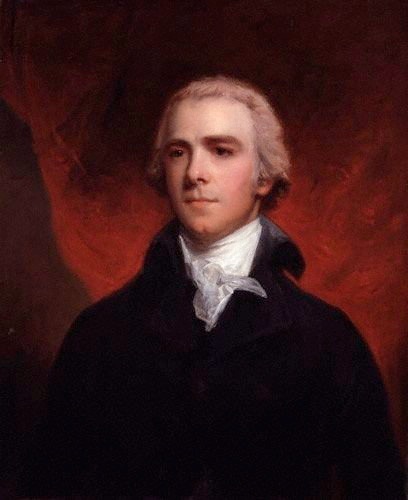
William Wyndam Grenville was the son of George Grenville, an earlier prime minister. Holding office for only a year, he shared his father’s poor public image, though he did achieve one notable achievement – the abolition of slavery.
Entering the Commons in 1782, Grenville became a close ally of Prime Minister William Pitt the Younger. He served in Pitt’s government as Home Secretary, Leader of the House of Lords as Baron Grenville, and Secretary of State for Foreign Affairs.
As Foreign Secretary, Grenville oversaw the tumultuous Wars of the French Revolution, focusing on fighting on the continent as the key to victory, rather than war at sea and in the colonies.
In 1801 Grenville left office at the same time as Pitt, over the issue of Catholic Emancipation.
In his years out of office, Grenville became close to Opposition leader Charles James Fox, and when Pitt returned to office in 1804, Grenville did not take part.
Cross-party alliance
On Pitt’s death Grenville was invited to form a government, but did so reluctantly. He formed a cross-party alliance of MPs which became known as the “Ministry of all The Talents”.
It was a coalition between Grenville’s supporters, the Foxite Whigs, and the supporters of former Prime Minister Lord Sidmouth. Grenville, as First Lord of the Treasury, and Fox, as Foreign Secretary, were joint leaders.
Grenville’s ministry was mostly unsuccessful, failing to make peace with France or to accomplish Catholic emancipation. It did, though, result in one momentous achievement – the abolition of the slave trade in 1807.
The end of his term came soon after, however, as a result of struggle over the perennial issue of Catholic emancipation. He tendered his resignation with palpable relief.
In the following years, Grenville continued in opposition maintaining his alliance with the Whigs, criticizing the Peninsular War and refusing to join Lord Liverpool’s government in 1812.
In years after the Peninsular War, Grenville gradually moved back closer to the Tories, but his political career was ended by a stroke in 1823, the start of a long period of ill-health which led to his death a decade later.
Ministry
02/11/1806 03/31/1807
Lord Grenville – First Lord of the Treasury and Leader of the House of Lords
Charles James Fox – Foreign Secretary and Leader of the House of Commons
The Lord Erskine – Lord Chancellor
The Earl Fitzwilliam – Lord President of the Council
The Viscount Sidmouth – Lord Privy Seal
The Earl Spencer – Secretary of State for the Home Department
William Windham – Secretary of State for War and the Colonies
Viscount Howick – First Lord of the Admiralty
Lord Henry Petty – Chancellor of the Exchequer
The Earl of Moira – Master-General of the Ordnance
The Lord Ellenborough – Chief Justice, King’s Bench
Changes
September, 1806 – On Fox’s death, Lord Howick succeeds him as Foreign Secretary and Leader of the House of Commons. Thomas Grenville succeeds Howick at the Admiralty. Lord Fitzwilliam becomes Minister without Portfolio, and Lord Sidmouth succeeds him as Lord President. Lord Holland succeeds Sidmouth as Lord Privy Seal.
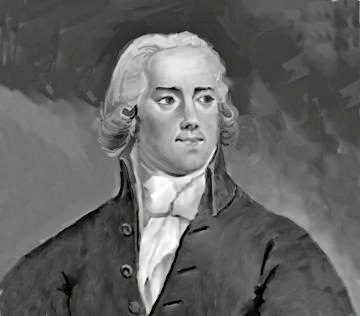
On his resignation; “The deed is done and I am again a free man, and to you I may express what it would seem like affection to say to others, the infinite pleasure I derive from emancipation.
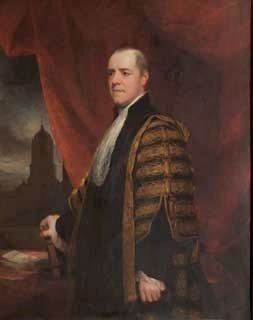
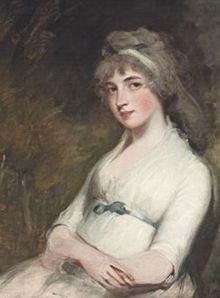
Honourable Anne Pitt was born in 1772. She was the daughter of Thomas Pitt, 1st Lord Camelford, Baron of Boconnoc and Anne Wilkinson. She married William Wyndham Grenville, 1st Baron Grenville, son of Rt. Hon. George Grenville and Elizabeth Wyndham, on 18 July 1792. She died on 13 June 1864. Her married name became Grenville. The marriage was childless.








June 19, 2012
A Regency Era Timeline 1798
The Regency Timeline
My previous posts I’ve explained that I was working on the Regency timeline. I posted my entries for 1788 thru 1797. Now I have the entrees for 1798 and have uploaded all these years to the Regency Assembly Press website. You can see a little preview of this below in the picture.
My sources which include the Internet and The Timetables of History by Grun and Stein as well as the Chronology of CULTURE y Paxton and Fairfield should cover a lot of events. There are now over 5000 listed for the period between 1788 and 1837 when Victoria comes to the Throne. I have also just found a third book I own with timelines in it, very USA centric though.
as well as the Chronology of CULTURE y Paxton and Fairfield should cover a lot of events. There are now over 5000 listed for the period between 1788 and 1837 when Victoria comes to the Throne. I have also just found a third book I own with timelines in it, very USA centric though. 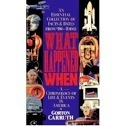 What Happened When by Carruth. I also have added a Dorling Kindersley book
What Happened When by Carruth. I also have added a Dorling Kindersley book 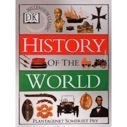 , History of the World.
, History of the World.
I may post a year at time every so often in between scanning through all these to find something that will be a good article for this blog and the blog at English Historical Fiction Authors. I will also have the full listing up shortly at Regency Assembly Press.
Those who have feedback, it is appreciated or if someone would like a specific year in a future post. The very first entry is to show who was Prime Minister of Great Britain, later it was the United Kingdom, during the period of the chronology. In choosing our dates, 1788 is the first sign of madness in George the III, it is the beginning of the end of the French Monarchy with the riots in Paris, it is the time when the mama’s of the girls during the true Regency would be girls going to London for their own season, and when our heroes are young lads or babes as well.
We need to know of the events that occurred when they were children, as well as what happens when they are on stage in our stories.
Click on the link below or the picture to go to the entry. More years coming. The list is now over 5000 event entries long and growing.
Regency Assembly Press 1798 Tineline








June 18, 2012
A Regency Timeline 1794 Revisited and a new Regency Novel-The Heir
The Regency Timeline
My previous posts I’ve explained that I was working on the Regency timeline. I posted my entries for 1788 thru 1797.
Now I have the 1794 Timeline again. I went back added a significant amount of graphics. I will be doing this with all the years I previously posted and then ensuring that the new years have a lot of graphics as well.
I have uploaded all these years to the Regency Assembly Press website. You can see a little preview of this below in the picture. I especially like how the Duchess of Alba by Goya looks a lot like Cher.
My sources which include the Internet and The Timetables of History by Grun and Stein as well as the Chronology of CULTURE y Paxton and Fairfield should cover a lot of events. There are now over 5000 listed for the period between 1788 and 1837 when Victoria comes to the Throne. I have also just found a third book I own with timelines in it, very USA centric though.
as well as the Chronology of CULTURE y Paxton and Fairfield should cover a lot of events. There are now over 5000 listed for the period between 1788 and 1837 when Victoria comes to the Throne. I have also just found a third book I own with timelines in it, very USA centric though. 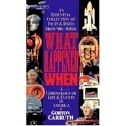 What Happened When by Carruth. I also have added a Dorling Kindersley book
What Happened When by Carruth. I also have added a Dorling Kindersley book 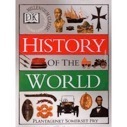 , History of the World.
, History of the World.
I may post a year at time every so often in between scanning through all these to find something that will be a good article for this blog and the blog at English Historical Fiction Authors. I will also have the full listing up shortly at Regency Assembly Press.
Those who have feedback, it is appreciated or if someone would like a specific year in a future post. The very first entry is to show who was Prime Minister of Great Britain, later it was the United Kingdom, during the period of the chronology. In choosing our dates, 1788 is the first sign of madness in George the III, it is the beginning of the end of the French Monarchy with the riots in Paris, it is the time when the mama’s of the girls during the true Regency would be girls going to London for their own season, and when our heroes are young lads or babes as well.
We need to know of the events that occurred when they were children, as well as what happens when they are on stage in our stories.
Click on the link below or the picture to go to the entry. More years coming. The list is now over 5000 event entries long and growing.
After the Regency Timeline, I plan to do a short addition on Regency Prime Ministers. They always come up in my research and I think we need a page where we can find out all about them in one place. Then, the Edwardian Timeline. I am thinking the years 1890 to 1918 (The end of WWI)
Regency Assembly Press 1794 Tineline
The Writing LIfe
My new writing project is another regency, tentatively titled The Heir. I am now over 200 pages into it. The heroine of course can not stand the hero, who is trying to understand why she dislikes him so. Part of the action takes place in St. James Square, where I have located our Heroine’s home. That was written about, in a blog post from fellow writer Angelyn Schmid on her post about Let’s do Business in Bed.
I enclose a few more paragraphs from the first draft.
Chapter 2
Sebastian could attest to that. He had met with the enemy at Corunna and tried his best to keep it from his memory. However, all too often in the depth of night, the remembrance of the battle would bring him forth from deep slumber. His brow heavy with sweat and his mind filled with the horrors of that battle.
The battle was now a little over three years gone. And still Sebastian was troubled by it. He was troubled a great many things. The battles effects troubled he that he often was awoken in the night when his dreams were distressed by the memories. When you see a human being torn apart by the cannon balls, more than one, it is a memory you wish you did not have and could never rid yourself of.
Drink helped, but then he never knew what night he would be set upon by these visages in his mind. And he was not in the habit of drinking so that he was in a stupor. Such a habit led to becoming an ondit of the Ton. And the only thing that the Ton did scold him for was his wooing of far too many women, and offering for none.
Sebastian had taken the advice of his uncle to heart. To find a woman to wed and beget more heirs for the Earldom of Bath. Ones the eighth Earl would take pride in. Three years more of his and Lady Elizabeth having no joy. And from what he had heard of his cousin Annabella and her first season, the hope that she would marry a man of quality was dashed when she surrounded herself like a ninny with only flatterers who knew to the farthing how much the Earl would part with, and what the estate would be worth should a son come of her body.
He had approached her once at Almacks but she had said all her dances were taken and she did not need his pity to be seen lifting her up. That was a fine how do you do, and should the Earl have been in attendance at Almacks, Sebastian would have been so embarrassed that he would not have been able to meet the man, who was his benefactor.
Annabella must have had some reflection or talked to the Countess who was always pleasant, for he had received a curtly written letter, which one might even take for an apology. You would have to be generous in order to do so. Sebastian had little idea that his cousin, whom he had not seen since before going down to Oxford, until the once at Almacks, was so proud that she could not be seen with her cousin, a commoner.
Or rather, he had been a commoner. His actions at Corunna had been recognized, and as the heir to the Earl of Bath, the Prince Regent had decided he should be a baronet. Sir Sebastian Lennox. A singular honor that he was to pay for the privilege. Prinny expected a nice gift for such a nice title, and that he be honored for some few months. Then, it was fine for Sebastian to leave the company of the Prince’s close circle and return to his own friends.
“Your cousin the Earl returns to Town, I see in the paper,” That was Marlowe. His father and the Earl had been good friends at one time. Some years back there had been a falling out. Sebastian was not sure why. He and Marlowe found that they favored the same play of cards at White’s and had become friends the last six months.
“Yes, he plans I am sure, to be ensconced on his bench when the House of Lords opens and gets down to business. The man is very much attuned and interested in politics.” Sebastian and Peter had talked of the Earl on some few occasions but usually the discussion of his cousin and Peter’s father did not arise.
“My father called me to his study the week before last and spoke to me at length of the Earl, and of my aunt. He, if you shall allow, told me all the sordid details.” And for the next few minutes, Peter explained how the Earl had offered for his aunt. How she had agreed, but a cavalry captain had come to also ask for her hand, after she had accepted the Earl. How she had loved the captain and was torn but in the end ran off with the officer. Who was dead not three months later from a sickness he had contracted most likely from his service in India. By then it was too late. The Earl had married the current Countess.
A woman that was known to Sebastian and he had only good things to say about. One didn’t say ill of a woman who you were related to, even to your closest friend. One never said ill of a lady. A shrew perhaps, but one honored a lady. Especially the Countess of Bath who was barren and the hopes of everyone, including Bass, seemed to be thwarted. “My father knows that we are friends and hopes that you shall come to dinner on occasion that he may hear of his old friend, and perhaps through our offices, if we deem the moment right, a reconciliation between the friends can be achieved.”
“Well, I am shocked, and though I should love to meet your father and do what I can, you should know that I am summoned to Lords when my cousin comes to Town, early when they sit. And then at the end of the season as they prepare to leave, I am invited to visit my cousin at St. James Square. I have been to dine there on occasion and the Countess has invited me to make evens for dinner, though now that my cousin, Lady Annabella has debuted, I was not needed last year. I fear my cousin has little regard for me. The girl. And that has caused the father to shun me somewhat. We did much better some years ago. He visited me at Oxford, and was quite about when my mother fell deathly ill shortly after our father died. We had no need to maintain much of a household then for the Earl bought James his commission, and paid for Hank to be a midshipman. He gave me an allowance at Oxford, and so we were sent to the corners of the globe. It was the girls who needed some mothering and family.”
Peter smiled, “I have met you sisters and know that you would not want to have had such young misses with you when you studied at Oxford.”
“Not so, I proposed that I should use my allowance and rent a small house for the girls there. The Earl sent them to my mother’s sister and paid handsomely for their upbringing. The eldest will be coming out this season, and the younger in two seasons hence. They both wish their other brothers, dressed smartly in their uniforms should attend them. Unfortunately all they have is myself.” Sebastian said. He looked forward to reuniting with his sisters, both to come to London in the next few weeks. He had the staff prepare the house, a nice townhouse that he rented on Panton Street. It was within walking distance or riding from everywhere.
“Well I look forward to meeting your sisters. I should imagine that they will be as pleasant as you old fellow. For the life of me I do not know how we have become friends.”
“It is because I bring calm to a life that was anything but. That, and we are quite successful when we partner at the card table.” Sebastian said.
“That is so. Do you realize I have not had to draw on my allowance since November? My father wanted to ask if I was alright or if I had stopped all my expenses. He was worried that he was to get a great dunning with hundreds of bills coming due all at once. That I had somehow convinced all my creditors to defer their settlements.”
Sebastian laughed, “I can not say quite the same. I still draw my allowance, though what money I have earned has been invested in land in Kent. Should the Earl ever be given a son, then I am out as heir, and though promised to be kept at my current generous estate, I should not want to be a burden to a man who must plan for the expenses of a son.”
Peter said, “Should that happen, then perhaps we should consider more cardplay. Our luck will only last for such a length of time that we best see how much we can manage to make from it as quickly as possible.”
That brought a laugh even as they were joined by the other two members of their set. Sir Francis Hamilton and Lord Beauchamp.
“Kit, Marlowe here was talking to me of trying to engineer a reconciliation with the Earl and his father. They were quite good friends at one time.” The Viscount Beauchamp’s mother was sisters to the Earl of Lennox’s first wife. That made Christopher Beauchamp the nephew of the Earl.
“Well, that would be awkward I think. My mother told me the whole story some time ago. And then reminded me of it after you came to dinner last week. She did not realize that you were the son of Sir Lambert. She said that your father had once been a welcome guest in my father’s house. That is before your aunt broke her engagement to my uncle. Can’t fault her. The man likes his horses, and likes Lords. Often say I can’t see much difference between the two of them.”
Sebastian thought that wasn’t very fair. Though he had not had as much interaction with his cousin, he had several long hours with the man. The man had more to him than his horses and the House of Lords.
“The interest that the Earl of Bath takes in the country by attending Lords, I should think you would consider admirable, my lord. How often did you attend Lords last year, was it twice I believe you boasted proudly?” That was Francis Hamilton. He said exactly what Sebastian was thinking. “Come Bass, I have heard you speak in favor of your cousin some few times. Not to mention that he gave you that courser last year and have we not made some money on his running, so his work at breeding horses is worthwhile as well.”








June 17, 2012
Regency Era Prime Ministers-Henry Addington
Regency History
Often in my research I keep needing to find who was leading the government and do this through every book. I thought that having the list handy would be good, and then turning it into a research webpage even better. Here is the list. After I post a few more Timeline years and write some more, I will work on the web page with notes about each PM.
The next PM I am doing is Henry Addington and I am hosting a page devoted to him and then all our period PMs at Regency Assembly Press. That page is here.
William Henry Cavendish-Bentinck, 3rd Duke of Portland
04/02/1783
12/19/1783
Whig
William Pitt the Younger
12/19/1783
03/14/1801
Tory
Henry Addington 1st Viscount Sidmouth, “The Doctor”
03/14/1801
05/10/1804
Tory
William Pitt the Younger
05/10/1804
01/23/1806
Tory
William Wyndham Grenville, 1st Baron Grenville
02/11/1806
03/31/1807
William Henry Cavendish-Bentinck, 3rd Duke of Portland
03/31/1807
10/04/1809
Tory*
Spencer Perceval
10/04/1809
05/11/1812
Robert Banks Jenkinson, 2nd Earl of Liverpool
06/08/1812
04/09/1827
George Canning
04/10/1827
08/08/1827
Frederick John Robinson, 1st Viscount Goderich
08/31/1827
08/21/1828
Arthur Wellesley, 1st Duke of Wellington
08/22/1828
11/16/1830
Charles Grey, 2nd Earl Grey
11/22/1830
07/16/1834
William Lamb, 2nd Viscount Melbourne
07/16/1834
11/14/1834
Arthur Wellesley, 1st Duke of Wellington
11/14/1834
12/10/1834
Sir Robert Peel, 2nd Baronet
12/10/1834
04/18/1835
William Lamb, 2nd Viscount Melbourne
04/18/1835
08/30/1841
Tory* (Tory government, PM a Whig)
Henry Addington 1st Viscount Sidmouth, “The Doctor”
Born 05/30/1757 Holburn, London
Died 02/15/1844 London
Major Acts:
Treaty of Amiens 1802-The Intermission of the great world war with Revolutionary and Napoleonic France
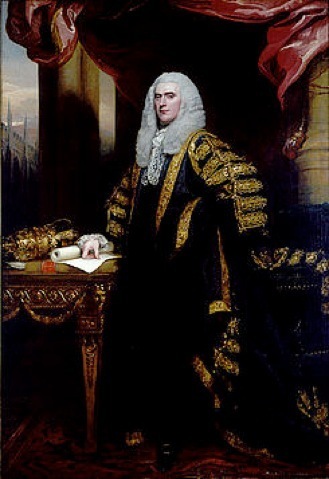
The son of a doctor (Anthony Addington), who was the Physician of the Elder Pitt, Henry Addington was the first middle-class prime minister, holding office from 1801 to 1804. Having served as Speaker of the House of Commons from 1789, Addington became PM when King George III rejected Pitt’s Emancipation of Catholics Bill, forcing his resignation.
Addington also enjoyed royal favour because he had treated George III as a doctor during one of his bouts of madness.
Addington’s ministry was most notable for the negotiation of the Treaty of Amiens of 1802, in which the government agreed to an unfavourable peace with France. A peace which didn’t last. It was a brief chance to catch their breath.
It quickly broke down, and Addington could not persuade Pitt to support him as war loomed on the continent. With Napoleon’s forces readying themselves for an invasion of Britain, Addington resigned.
A notably poor orator, Addington continued to serve under Pitt, and was later elevated to the House of Lords as Viscount Sidmouth. He went on to hold office in the governments of Grenville and Lord Liverpool.
Ministry
03/17/1801 05/10/180
Henry Addington First Lord of the Treasury and Chancellor of the Exchequer
Lord Eldon Lord Chancellor
Lord Chatham Lord President of the Council and Master-General of the Ordnance
Lord Westmorland Lord Privy Seal
The Duke of Portland Secretary of State for the Home Department
Lord Hawkesbury Secretary of State for Foreign Affairs
Lord Hobart Secretary of State for War and the Colonies
Lord St Vincent First Lord of the Admiralty
Lord Liverpool President of the Board of Trade
Changes
May, 1801 – Lord Lewisham (who becomes Lord Dartmouth in July), the President of the Board of Control, enters the Cabinet
July, 1801 – The Duke of Portland succeeds Lord Chatham as Lord President (Chatham remains Master of the Ordnance). Lord Pelham succeeds Portland as Home Secretary.
July, 1802 – Lord Castlereagh succeeds Lord Dartmouth at the Board of Control.
August, 1803 – Charles Philip Yorke succeeds Lord Pelham as Home Secretary.
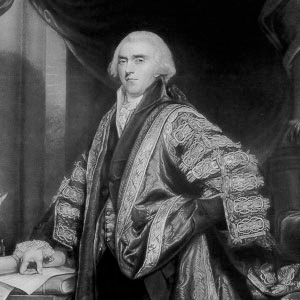
“In youth, the absence of pleasure is pain, in old age the absence of pain is pleasure.”
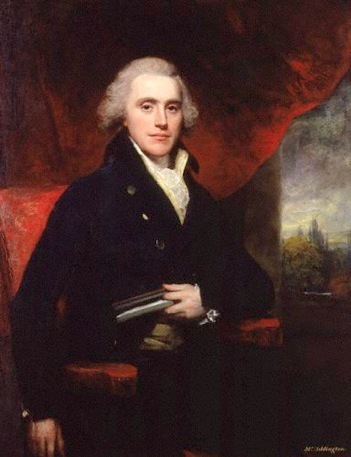
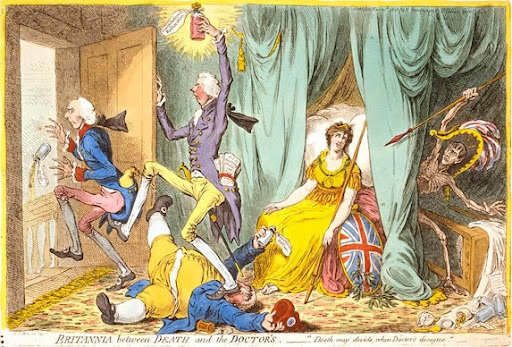
A Gilray cartoon:
A faint Britannia seated on bed with three “doctors,” William Pitt kicking Henry Addington and stepping on Charles James Fox. The figure of death, with Napoleon’s head, strides from behind bed curtains.









